#movie essay
Text
The Batman: A Tale of Vengeance and Healing
youtube
This was such an amazing video essay. Any Batman or related fan should listen to this. It talks about how The Batman made a character, asked what type of world would create that character, and tested that character's bias and belief until the grew to understand more. If I had to recommend any video it's this one.
#dc#dc comics#bruce wayne#batman#the batman#video essay#movie essay#batman comics#batman movies#batfamily#batfam#Youtube
48 notes
·
View notes
Text
How to Portray Real Love - and How Not to
Warning: long post.
Call Me by Your Name (2017)
To anyone who loves this movie:
I will not apologize for what I am going to write. It’s my own take, yes, but in my opinion all of this ought to be obvious to anyone watching the movie.
I will not refer to André Aciman’s book, not having read it.
I am Italian and I grew up in places like we see in the movie. I’m not denying that the way it’s shot and the general atmosphere are often gorgeous, but that was not sufficient to convince me that this movie is romantic, probably because I’m used to it.
What This is Not: Grooming / Sexual Predation
Reading up reactions to this movie, I have stumbled often over criticism about the age gap between the two protagonists. In my opinion this is beside the point: we are speaking of 7 years, not of a generational gap, and Oliver is still a student. Elio is mature for his age, and after some initial reticence, he approaches Oliver by himself over and over. His family knows and encourages (or at least doesn't oppose) them, and Elio has more than one opportunity to say no, which he doesn’t take.
Oliver is not a predator. He’s confused, but that’s not because he doesn't feel the attraction between himself and Elio: he simply doesn’t understand it.
Elephant in the room no. 1: Oliver is a bad person.
Oliver comes across as irreverent and self-absorbed. He does not respect boundaries, does not knock on doors, does not fit in with the lifestyle and customs of his hosts, only occasionally he does things that will make people think well of him. Early in their acquaintance he expects Elio to tell him what he is going on in his head but doesn't do the same in return (he never does, even later); his entire behaviour seems to be aimed at irritating and challenging his surroundings.
There is no depth in Oliver, no creativity, contrarily to Elio who already composes at age 17; somehow Oliver seems to know that he is the inferior one. At times he is downright offensive to Elio, for no reason at all, like he wasn’t a guest in their house. Oliver moves around in a foreign place like everybody owes him; he does not wonder, question, ask for explanations. He plays with Elio’s youthful insecurity, who is still hardly shaving and feels in the shadow of Oliver’s allegedly superior manliness. It is not surprising that to Elio he soon appears as some kind of handsome, unreachable prince.
Oliver is the kind of person who manages, on purpose or not, to convince the people around him that he is someone special, irresistible, and that being his friend or lover is a privilege. Elio falls for it, and Oliver picks the fruit of that attraction. Oliver does not love Elio because he does not love anyone, being too busy with thinking of himself.
At first Elio doesn’t like him; he notices that although Oliver never shows regard for anyone, he gets away with it. Elio’s family and friends fall for his self-assuredness and expect him to befriend Oliver. Piqued by the fact that Elio is the only person who is wary around him (with good reason!), Oliver repeatedly behaves in a way that frustrates Elio, repeatedly invading his private space, ignoring his limits, alternating insults with niceties, giving him attention one minute and completely ignoring him the next. And he never seems scheming picking at Elio’s insecurities whenever he gets a pass: it’s like second nature to him. He doesn’t do it because he loves Elio and doesn’t want to admit it, because he’s scared or something like that; he does it because he can, and because it works. He wants Elio to look up to him the way everybody does. After a while, the insecure Elio gets obsessed with wanting the older man’s approval.
Oliver starts a relationship with Elio knowing that the younger man has a girlfriend; he doesn’t even ask about her, whether Elio broke up with her etc. Oliver seems to believe that Elio owes him his undivided attention. By keeping their relationship a secret, Oliver makes the hapless Elio his accomplice. Even if he wanted to or if he would slowly begin to suspect that something's not right, he couldn’t talk to anyone about it. No one would believe him anyway, since everybody thinks the world of Oliver.
Oliver humiliates Elio, who by then is his lover, when he finds out about the peach: he laughs at him, not with him. (Why was Elio masturbating anyway, while he was in a sexual relationship?) When they are in Bergamo Oliver starts partying with random strangers on the street (with a woman!) when Elio is about to be sick: an observant lover would have noticed it before it was too late. Although they live under the same roof, he never sleeps in the same bed with him but gets up earlier, even when they are sharing a hotel room. He never tells Elio what is making him refrain from intimacy.
Oliver destroys Elio’s creativity by commenting negatively both on his composition and his impassioned love letter; we never see the young man making music or writing again. Shouldn’t a person in requited love feel inspired and happy and want to sing and play all day long? That he gives up on his interests already foreshadows the deep depression Elio is destined to fall into.
Viewers who love this movie like to argue that Oliver is so distant because he’s afraid of hurting Elio or shy because he’s in the closet. But it’s plain to see that Oliver knows exactly what he’s doing. He just doesn’t understand why because he’s not the kind of person who second-guesses himself. He’s controlling a power play with a younger man, probably because he doesn’t know how to have a genuine relationship with anyone. And Elio is too defenceless against him. When his mother comes to pick him up at the railway station and his voice breaks on the phone, it is obvious what a child Elio still is interiorly. He didn’t grow up through this relationship. He didn’t know what he was getting into and then had to pay the full price for another man’s egotism.
As the movie comes to a close, we can see that what he and Elio shared did hit Oliver harder than he had expected, but not enough for him to change, or only to reflect about it. Oliver is not aware of what he’s doing to Elio; to him everything is fun and games while to Elio it’s a life-changing experience.

Elephant in the room no. 2: Elio is not in love, he’s hooked.
Elio begins to imitate Oliver like a younger brother would do with the older - he smokes, wears a Jewish symbol on a chain, he has sex with Marzia only to prove a point because he knows Oliver had sex with Chiara. After a while, he gets obsessed with wanting the older man’s approval, for him to see him as an equal instead of an annoying boy he can either ignore or boss around.
Being both intellectual and highly sensitive, Elio believes that the more experienced and seemingly more mature Oliver must know the answers to life’s most burning questions; which Oliver doesn’t, as much as Elio wishes he would.
There isn’t the slightest sign of genuine love coming from Oliver; he only takes. Elio, being a giving, honest person, falls into a trap. Oliver has caught Elio and also half a dozen other people in his net, but he never had the slightest intention to put his roots down and actually like anyone back. Oliver’s attitude towards Elio is avoidant, but that is not because he wants to prevent him or himself from getting hurt; it’s because he doesn’t want to get attached and have to face the consequences.
In the scene where we first see Oliver interact with the family, he says at breakfast that he shouldn’t eat an egg because otherwise he’ll eat two, three, and more until they will have to roll him away. This already shows what kind of person Oliver is: he doesn’t know when to stop. Elio mistakenly believes that this lack of restrain, this want of limits is a sign of superior maturity and self-assuredness. He won’t realize to the last that in truth this attitude shows nothing short of a total lack of responsibility.
Elio says so to his father once: he does not play poker. Oliver is a poker player through and through. Despite the poetic request to “call him by his name”, Oliver remains shrouded in mystery. He does not change; while Elio wakes up, both sexually and emotionally.
There also is the symbolism: the dying fish gasping its least breath with eyes wide open (symbolizing Elio), the bronze statue, beautiful but cold and lifeless (symbolizing Oliver). The connection is made by the fact that both tokens come from the water.

All Oliver wanted and expected was to spend a good time in Italy with no strings attached. Which also is why we hardly see him working and studying, the way he’s supposed to. After all he did to Elio, his final revelation that he has a girlfriend and is about to marry her is only the coup de grâce.
Elephant in the room no. 3: Elio’s father is a fool.
I couldn’t bring myself to admire Elio’s father for what he said to his son, presumably wanting to comfort him: that “it had been a particularly beautiful thing between them”, and “he wished he would have made such an experience.”
How does he know what happened in detail? Does he know what is in these two young men’s hearts? Does he know about the humiliations Oliver inflicted on Elio? Probably not, but in any case, Oliver has given him no reason to believe that he’s a good person the way he claims.
We did not see father and son interact at all before this scene. All we learn is that both Elio’s parents expect their son to be nice to their guest and to befriend him, and that they don’t mind if there is more than friendship. We never learn whether Elio’s father loves him and cares for him (at least his mother shows affection from time to time). Imagine needing to have your entire world and happiness destroyed just so your father will finally give you some attention and kindness.
Elio’s father never changes his mind, even when he learns that Oliver is getting married. A caring, responsible father would have opened his son’s eyes about the fact that he was used and then discarded. I have no clue as to why any queer person would want their parent to do anything like that to them, leaving their heart open to bleed.
Add to this that he does not ask whether they used protection. The movie is set in 1983, and the first AIDS wave struck in 1981. Papa Perlman doesn’t seem to mind that his son might have caught a horrible, incurable disease, all that matters is that his son had sex with another male. Yay. (Maybe he believes in the adage that true love exists only between members of the same sex, who knows.)
I guess this little speech is meant to be politically correct. Woe if you dare to see the dysfunction in a relationship when it’s same-sex.
Elephant in the room no. 4: Elio did not need Oliver.
When we meet him, Elio is well-educated, living in a beautiful place where he also grew up, he has a supportive family, enough free time (they even have servants), he’s healthy and serene and he has a girlfriend. He’s intelligent, well-learned and creative.
When we last see him, he’s devastated, staring into the fire and crying for minutes on end.
Oliver is not “only” a sexual predator. He’s a textbook manipulator, the sexual part isn’t even what it’s about. Manipulators may want money, sex, attention from their victims or a combination of these, but what they always want is power. They rejoice in the knowledge that their prey is ready to do whatever they want at their command, that they can’t live without them, at least not happily. Oliver would have taken anything Elio gave him and crushed it, not just his sexuality.
Just imagine the pain Elio must feel now every time someone says his own name, or when he goes to his “special place” by the creek! He can’t compose, play the guitar or write any more, because everything reminds him of Oliver. And all of the time, Oliver had the chance to either avoid a relationship with him or to let go once he had left him; but you need some basic common decency for that.
Oliver realized quickly that Elio, though younger, is much better than he is, healthier, smarter, more accomplished, more innocent, honest and kind-hearted. Oliver took all that, used it or destroyed it and left Elio in the shards of his former self, no longer in a position to enjoy the things and the people he used to love, tortured additionally by the knowledge that Oliver is about to marry someone else, i.e. that Elio apparently wasn’t good enough for him. Elio ends like a modern Pygmalion, crying about the fact that all of his love could not bring the object of his adoration to life; hence also the parallel between Oliver and the statue.
Elephant in the room no. 5: Elio is not gay, he’s bisexual. (Maybe.)
Elio has a girlfriend when we first meet him; it is also hinted at that before Marzia, he was with Chiara. No sign of a boyfriend anywhere. No sign even of some brotherly male friend to whom he might feel unconsciously attracted.
Elio enjoyed his first sexual experience with Marzia, we hear him cry out “That feels so good!” He then starts an affair with Oliver, but nothing suggests that he likes it any better. Yes, he keeps sleeping with him, not with her; but she didn’t manipulate him for weeks into believing that without her he would be missing out, the way Oliver did.
If Oliver was a woman of 24 years who would seduce Elio, dragging him away from his girlfriend, and then dumping him to marry another guy, everybody would call her a heartless bitch. In this case, Elio’s supposed sexual awakening supersedes everything else. Which is probably the main reason why so many viewers insist that there was nothing wrong and unhealthy between them. The relationship between Elio and Oliver can’t have been sick and dysfunctional, because Elio apparently “needed to realize that he's gay (or bi).” Never mind that he was traumatized for life.
In the end, Elio is alone; Oliver has left him for good, and he can’t go back to Marzia. Had Oliver not interfered Elio might have missed out a nuance on his sexuality, but he wouldn't have had his heart broken, and he would have a girlfriend who is a sweet and kind girl, never manipulates him and even offers him friendship and comfort after he dumped her for no reason (after having taken her virginity no less).
Part 6: Elio Always Had a Choice.
Elio wasn’t forced to do anything. He sought Oliver out repeatedly and never actively said “no” to him, except for his heart-wrenching protest during the infamous peach scene. Maybe he wants Oliver to single him out being a victim of his own vanity; however, his personality is not explored enough for the viewer to come to a fair conclusion. We mostly see him react to Oliver, not act on his own.
Since the focus of the movie is on the Elio / Oliver relationship, the landscape the story takes place in is idyllic, the music is beautiful etc., as a viewer one can easily assume that Elio chose Oliver of out “love”. Did he?
Obsession is not love. When feelings for another person are so strong that there seems to be no escape, it doesn’t mean they are soulmates, that it’s fate or anything like that. Healthy love is a choice; love only exists in freedom. When one partner (or both) is in mental chains, his mind revolving around the other, something is very wrong.
I already wrote that while his character is manipulative, Oliver is not an actual predator. If the victim has the chance to escape and does not take it, there is a large part of responsibility on the latter’s part, too. It is not enough to say that Elio is “only a teenager”. At seventeen, a person knows what they are doing and what they want. They may not be aware of the implications and the consequences, but Oliver and Elio’s parents didn’t know either, so it’s useless to say that age makes the difference.
Part 7: Culture Clash.
Italy and Elio’s family welcome Oliver with open arms; they let him live in their house, let him do whatever he wants, invite him to come back next year, encourage his feelings for Elio. Oliver never opens up. He does not speak about his thoughts; he never mentions that he has a girlfriend at home. Only in the end we learn that his family seems to be very bigoted. Which is of course awful, but as a viewer I couldn’t feel sorry for him. This is something that in all fairness he should have told Elio from the start, before playing fast and loose with a young man who was obviously smitten with him.
Oliver is a consumerist, diametrically opposed to the deep soul of Elio, a young man who grew up surrounded by nature, in a house and near cities that feel timeless. Oliver tells Elio once that his family had welcomed him like he was a son-in-law, but this only shows that Oliver has no clue about Italian mentality; else he would know that it is second nature to most Italians to be welcoming and to make acquaintances part of the family quickly. That he believes they did so specifically with him only reflects his arrogance.
On a side note: in Italy the paragraph against homosexuality fell in 1890, and this movie is set almost a century later. And Oliver was introduced to an elderly gay couple who are friends of the family, emphasizing that Elio’s family doesn’t have the slightest issue with same-sex relationships. So, we are not speaking of star-crossed lovers. Had he wanted to, Oliver could have moved to Italy leaving his bigoted background behind, finding both a better family and a partner who would do anything in his power to make him happy. But that would also have meant having to give up on something, and Oliver is not the kind of person who would accept any kind of sacrifice, not even for his own sake. He will rather see to it that the price for his choices is paid by someone else.
Part 8: Attitude Towards Females.
The way both Oliver and Elio treat the women in their lives is downright awful. Oliver flirts with Chiara and in return, Elio soon brags how he “almost had sex with Marzia”. It is clear enough that they only do it when the other is watching; they do not care about the girls, both only want to show off their sex lives.
Sex has no real value for Oliver; he tells Elio that he should better “try and fail with Marzia than not try at all”. He does not consider that having your first time and be in an actual relationship is serious stuff. It ought to be something two people do together, not a challenge of sorts.
Although with Marzia it’s the first time for both of them, Elio obviously does not care for her - he did not even recognize her voice on the phone and did not react when she told him she didn’t want to suffer because of him. His next thought is that he wants Oliver, not her. He even has sex with Marzia all the while watching the clock for the appointment at midnight Oliver gave him. (What for, anyway? Distraction? As a training object?) His obsession with Oliver makes him selfish and false. And Oliver has tied his invitation to another insult, “Grow up.” Elio is seventeen and he has sex with both a female and a male within the course of 24 hours. Why - out of pique, to prove Oliver that he is indeed grown-up and that he is not ‘too scared to do it’?
Oliver does not offer Elio or his family friendship; he does not even call or write a postcard from his home to let them know that he came back home safely. Ironically, it is Marzia who offers her friendship and comforts the heartbroken Elio, although she would have every reason to resent him. She is more mature and responsible than both Elio and Oliver although she is Elio’s age. Which makes his behaviour towards her only feel more unfair; but I guess viewers must expect her to accept that because what she and Elio shared was not the alleged “true love” he had with Oliver.
A few months after Oliver went back home, we learn that he is about to hurt the next person - a woman with whom he will start a loveless marriage. (We learn that he was in an on-off relationship with her for years, which fits the picture perfectly; Oliver would not want to miss out on anything.)
Elio’s father gives a monologue that reflects his marriage in an awful way: apparently it does not make him happy because it makes him feel like he missed out on the experience of “real love” (whatever he believes that is). His wife is a good person and a good mother and does not deserve to be dismissed like that.
Conclusion: This Is Not a Love Story.
There may be different ways of interpreting it, but this movie is not about love, i.e. honest, deep feelings and commitment for one another. It isn’t romantic or poetic or tragic. It’s about a lot of pain that could have been avoided.
Oliver is not a groomer who takes advantage of a younger and less experienced guy. If Elio was a few years older, Oliver would still be a bad person. Consider that no one seems to realize what an egotist he is, including the many adults he meets! Piqued by Elio’s resistance, Oliver would certainly still try to make a pass at Elio, except that if the latter was older, he would be more mature, and possibly also have, by now, a secure attachment with Marzia (or someone else). I do think that a relationship between a 17-year-old and a 24-year-old could work well, provided both are honest and loyal persons. What makes this story problematic is not grooming or sexual predation on Oliver’s part. It is the relationship itself between these two that is utterly dysfunctional; which is, I daresay, what actually makes so many viewers feel uneasy about it the way I did.
Real love looks different; it does not only leave pain and “what if”s behind. Oliver sweeps into a foreign family and culture like a storm, takes what he can, and after him the deluge. While Elio is changed for life, Oliver just runs off to the next best thing, still not ready to change, take responsibility, or at least apologize for having used a younger man for an affair before agreeing to a socially acceptable marriage with a woman.
The musical theme of the movie is “Mystery of Love”. Why? Fantasizing about someone you never really get to know because they never open up to you is not love. How can there be love without honesty, loyalty and trust? Elio never grows beyond the first phase of a romantic relationship where you still idealize the other, instead of seeing them for how they truly are. And Oliver doesn’t even reach that phase.
We are supposed to feel for Oliver and Elio them because they are “star crossed”; I can’t bring myself to do that. Oliver is too immature to be honest with Elio and to keep him at arm’s length to prevent him from hurt; while Elio is not grown and strong enough to stand up first for his own self-love, and then for his feelings for Oliver. He does not even confront him when he tells him he is about to get married (which also implies that he will not come back). Not for one moment seems Elio to realize that he was betrayed, used and dumped. Instead, he keeps believing that he missed out on something that could have been wonderful.
If you are in a problematic relationship, there are only two options: either you renounce because you don’t want to make the other unhappy, or you fight for your love. Nurturing false hopes, allowing love to make its way into the heart of a naïve, well-meaning young person and then let him fall like a hot potato is the last thing anyone ought to do. Oliver doesn’t trust anyone, while Elio’s trust in him, after his initial hesitation, is infinite.
When Oliver tells Elio on the phone that he forgot nothing, it only makes Elio suffer more. A mature, caring person could have told his former lover to get over him, and that he was grateful for the time passed together. There is not gratitude in Oliver’s words; he ties Elio to him again, knowing that the younger man would be his at the lift of a finger. During the phone call, he does not even have the politeness to ask how everybody is doing. As usual, it is all about him. Oliver may be the victim of his family’s bigotry, but I cannot bring myself to feel with someone who is so utterly selfish and irresponsible. At least now that it's clear that he’s not coming back, he should have the decency to let go.
It is certainly true - as Elio’s father said - that it’s better to accept one’s pain than to turn away from it. But: the easiest way to unhappiness is holding on to something (or someone) you can’t have, respectively that never existed in the first place. Elio never gets over his feelings and they make him suffer still decades later, proving that the brief happiness was not worth the pain. What Elio feels at the end is not the normal heartache everybody goes through after a break-up: he’s traumatized because his budding personality was crushed and he has nothing to hold on to or to look forward anymore.
I wonder why this movie is called a love story. There is mutual attraction, fascination, erotic tension, but all of this doesn’t add to love. I see no reason why anyone should love someone like Oliver, and I can’t understand why Oliver does not love Elio back, who shared everything he was with him.
This movie may be interesting, but in my opinion it’s not romantic at all and I see no reason to sigh and wax poetic about it like 95 % of the audience seems to. If anything, it’s a warning to not confuse obsession and idealization with actual caring.
I wonder why the LGBT+ community does not hate this movie.
I have often heard in conservative circles that gay men are supposedly straight until they meet someone who is older and experienced who seduces them and “makes them gay”. I always found this to be a narrow-minded prejudice, and thought that any queer person must find such an idea insulting to say the least. But this is exactly what is being portrayed here. And almost no viewer, queer or straight, seems to have the slightest problem with it. On the contrary, almost everybody gushes on how romantic this story is.
~ * ~ * ~ *
Red, White and Royal Blue (2023)
Of course, this is a modern fairy tale and it’s set in an alternative universe. Let me just point out the differences to the above-mentioned movie, and why this is a much more genuine portrayal of romantic love.
Since the story is about the son of a female US president who is running for her second term and the offspring of a conservative British peerage family, the conflict goes without saying; there is no wondering about what is making their relationship difficult.
Alex, once in a same-sex relationship, embraces his bisexuality wholeheartedly. He does not fall into a crisis and does not mess around with some girl. He knows that Henry is who he wants. It is abundantly clear that Henry is special for him because with him he’s head over heels in love, not because he’s the first guy he makes sexual experiences with.
In this movie there is also a cultural clash between a Texan American and a British peer, but there is nothing offensive about it; usually it’s just played for fun, like when Alex doesn’t know what a maypole is and Henry teases him about it.
How much wiser and more to the point is Ellen’s reaction: she simply tells her son that “such a relationship will define his life”. Yes, it’s kind of embarrassing that she asks him whether they used protection, but at least it shows that she cares for his safety.
Side note: all women in this movie are treated with respect, not looked down upon, used and discarded.
Alex does not make Henry feel bad about his accomplishments. He admires him playing polo, he loves listening to him when he plays the piano, although Alex can do neither.
When Henry comes to visit Alex in Texas, he adapts by wearing casual clothing, drinking, singing, playing, swimming. He’s just himself and there is nothing of his usual detachment about him, on the contrary, he obviously feels happy with the chance to just be a young man like any other. Compare this to Oliver’s attitude of haughty superiority in his host’s place, behaving like he was a prince everyone must look up to (which he isn’t, contrarily to Henry).
These men are both adults who know what they are doing; none shows off as being superior and they never come across as selfish and mean. Initially Henry is detached and stiff-necked, while Alex pettily takes offense at something that happened years earlier; but all of that quickly changes through the dynamics between them. The two young men open up, become more relaxed and much more themselves through being together. Since they started as rivals, they know each other’s faults and never for a moment fall into the trap of idealization. Their connection is much more genuine and intimate than Oliver’s and Elio’s although technically, they spend less time together.
Their relationship is also much more fun; Alex and Henry banter, tease one another and laugh a lot. Being in a long-distance relationship they write each other e-mails and texts, and they have conversations over the phone still when they’re barely friends. They talk about personal issues, they keep eye contact, their hands touch, they hug outside of sexual contact, they sleep in the same bed whenever they can. The power dynamics between them are healthy, and it is made abundantly clear that the basis for their relationship is honest, trusting friendship.
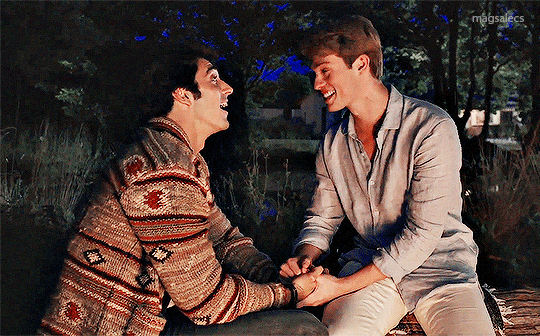
Shortly after having started an actual relationship with Henry, Alex plunges into his Texas campaign; he wants to use his influence as the president’s son to do good for other people. Henry’s philanthropic work and his overall influence inspire Alex to do more for his fellowmen, too.
When Henry panics and runs in the face of a declaration of love, Alex confronts him right away. Alex is willing to fight for his love. He „flies across an ocean and storms a f…ing palace“, in his words, to tell Henry he won’t give up on him.
As they say goodbye at the airport both gift one another what means most to them - ring and key. Alex until then never took his key chain off, not even when he was swimming or having sex. Alex’s last virtue is patience, yet he is willing to wait.
In the end the shy, introverted Henry says, “I will no longer be the prince of shame and secrets” finally confronting his worst fear, that his subjects may no longer like him.
Which is where we reach the bottom line.
„Real love“ is not defined by how deep, desperate and or romantic your feelings are.
Real love makes you a better, stronger and more mature person.
Red, White and Royal Blue is an actual, real and inspiring love story. Call Me by Your Name is a slap in the face.
#movie essay#rwrb#call me by your name#film analysis#relationships#same-sex#luca guadagnino#james ivory#thimothee chalamet#armie hammer#matthew lopez#casey mcquiston#taylor zakhar perez#nicholas galitzine#movie review#movie comparison#manipulation#narcissisim#dysfunctional relationship#cmbyn#psychology#romantic love#mental health#andré aciman#toxic relationship#romcom#red white and royal blue#emotional abuse#gay romance#firstprince
32 notes
·
View notes
Text
high school musical drama club analysis
im rewatching high school musical, as one does, and it didnt strike me till now that the drama club (or at the very least sharpay, and ryan by association) is actually pretty popular
lets start by making it clear that the basketball team is presented as the highest ranking in the school hierarchy, which is shown by intances like chad telling troy after status quo that "because he auditioned for the musical, people now think they can talk to them"
it is a constant throughout the entire show that we see how relevant the basketball team is for the school, so much in fact that the principal favors them and has basketball decor in his room
BUT what it is not so obvious is that the drama club is also popular! now, how have i come to this conclusion?
firstly, sharpay immediately is presented as a desired girl by the entire male population of the school (remembering, of course, that sharpay and ryan, but especially sharpay, are the faces of the drama club)
secondly, chad and the basketball team are not upset that troy wishes to audition for the musical because it would be "social suicide", which you might expect in a situation like this in any other high school show (which is the case of glee, another one of kenny ortega shows, so it goes to show that he's acutely aware of this directing choice), instead being upset because "people should stick to the stuff they know" as the song statuo quo says and because troy is the "basketball guy"
thirdly, chad, who was outraged the skaters now think they can talk to them, approaches ryan and sharpay when they are looking at the call back list (which we can analyze as chad seeing them as somewhat social equals)
fourthly, this might be a reach, but seating in the cafeteria in high school shows usually represents some form of hierarchy, the less popular kids sitting close to the trash cans and the more popular ones sitting at the better tables. what we know for a fact is the drama club table, because other than ryan and sharpay there's also kelsi sitting in it, is placed above the stairs at the very center, overlooking the entire cafeteria
fifthly, sharpay mentions how gabriella getting the part with troy would mean the scholastic club would go from drool to cool, meaning, at least in her manner of speaking, the club is below them
and lastly, chad, who is the most vocal in his disdain of the drama club, only speaks badly on in as ut opposes to basketball, telling troy following a musicak career would get him in his fridge as well, but mostly not attacking the musical directly other than making fun of its name "twinkle town"
anyways, overall i just think its interesting how the plot is so much more than you might see at first and i can do a whole analysis just on how much discourse there is on the statuo quo song (which is a fucking banger too)
#high school musical#sharpay evans#ryan evans#chad danforth#troy bolton#gabriella montez#hsm#chyan#show analysis#movie analysis#thoughts#movie essay
30 notes
·
View notes
Note
can you ramble about the present head man episode?
OH MY GOD YES YES YES OFC THANK YOU SO MUCH FOR ASKING ME THIS I LOVE U I AM GONNA MAKE COOKIES FOR YOU.
So the episode starts off with letting us know that Argos takes pride in his job as the welcoming committee, let's put a pin on this info cuz I'll come back to this later.
So the thing I found weird about that episode was why Argos didnt think of the possibility that the presents head might just be the present and isn't inside a present. Like literally everyone else in the void has like an object head, so why didn't that thought even cross his mind? Maybe because present guy didn't have any facial features? But I'm pretty sure there's other void members who don't have facial features too.
As the episode goes on we see him gets more and more curious about it, even though he knew that it wasn't his business ("I know, its none of my business!" Said by Argos to Mr plant) he becomes more desperate to see what's inside, that becomes everything he ever thinks about. He couldn't even get his mind off that while babysitting. And then he snapped, and finally went there. I don't think he even spend time going back home and stuff, I think he went there directly from his babysitting job, cuz he hit him with an abc book (probably got it for babysitting the kids) to knock him out.
We can see that he was self aware and apologetic, but he just couldn't help the curiosity that was growing more and more. This can be seen in the quote "I know, its none of my business!" Said by him to Mr plant, and can also see this because he said "I'm sorry about this" to the present guy before hitting him. He knows that he wasn't doing the right thing, he knows he shouldn't do this. But he can't help himself, he was getting desperate for answers.
I REALLY REALLY LOVE HOW ASHUR PORTRAYS HIS GUILT IN HIS FACE LIKE AHHH THAT PART IS SOOO SATISFYING. IM A DRAMA STUDENT AND THAT IS JUST FANTASTIC ACTING I WISH I COULD STEAL HIS ACTING SKILLS. I LOVE THE WAY HIS HANDS SLIGHTLY SHAKES WHEN HE FOUND OUT THAT IT WASNT A MASK AND HE JUST KILLED AN INNOCENT MAN. NOT JUST ANY MEN, GOING BACK TO THE POINT WE MADE AT THE BEGINNING, HE KILLED THE MAN HE WAS SUPPOSED TO HELP. HE TOOK PRIDE IN THIS JOB, BUT BECAUSE OF THAT JOB HE NOW HAS BLOOD ON HIS HANDS. LIKE UGHHH I REALLY REALLY LOVE THIS EPISODE.
Also also I find it interesting how when Argos imagines of what might be inside the present, he thinks "a telephone, an old boot, a smile". Like why would he think of objects (and a concept) if the reason he's so curious is cuz his head is a present, which is an object? Also I feel like the objects might be symbolic of smth and I'm not really sure what but I'm gonna go full ramble mode and just pull out bullshit outta my ass now.
Telephones represent communication, this could be reflective on the fact that Mr present died because they didn't communicate (he didn't answer argos's question when he asked why there's a present on his head). If he had told him that his head isn't inside the present and it is the present, he probably wouldn't have died. So lack of communication is a factor in his death.
An 'old boot' is a slang for "an ugly or disliked women". Ignoring the women and disliked part, being 'ugly' kinda contributed into his death as well? Cuz Argos couldn't realise that this was just how he looked like, and thought he looked like something else (that is inside the present). Also, boots can symbolize being natural or earthy. This reflects on why Mr present died, because Argos didn't think that having a present as a head was natural. So this is also a factor in his death.
A smile. The last two things were objects, but this one is a concept. It obviously represents happiness and joy, maybe this could show how Argos thought he'd be more satisfied and happy if he knew what Mr present was hiding inside his present. So this is also a factor for his death.
I HOPE THAT MADE SENSE LMAO IM NOT EXACTLY GOOD AT EXPLAINING. ALSO ALSO I REALLY LOVE HOW MR PLANT HELPED CLEAN UP THE MESS ITS JUST SO RELATIONSHIP GOALS I LOVE THEM
ANDDDDDDD THATS ALL!! THANK U AGAIN FOR ASKING THIS LIKE IM SOOOOOO GLAD I GET TO RAMBLE ABOUT IT IVE BEEN HAVING BRAINROT ABOUT THIS EPISODE FOR A WHILE NOW I JUST NEEDED SOMEONE TO ASK ME ABT IT SO I CAN ALLOW MYSELF TO TALK ABOUY IT LOL. THIS WAS SO FUN TO RAMBLE, I HOPE I MADE ANY SENSE AT ALL!! :DD
#an_theduckin#twomp#ashur gharavi#fav post#asks#thanks for the ask!#my ramblings#my text post#the world of mr plant#argos twomp#movie essay#<- not really but ye
35 notes
·
View notes
Text
RRR, Black Adam and the Response of the Oppressed
OR: The Colonial Wound and how to approach Violence as a solution against the mechanisms of oppression
OR: how to get the debate right VS how to ruin it completely

Spoiler: RRR gets it right
So, I was keeping this one to myself because it's a very delicate subject, but rejoicing in RRR's recent Golden Globe nomination, I thought hell might as well talk about it.
First of all, a very important disclaimer:
I am not here, in any way, defending or endorsing any side in this debate. My personal views on violence and armed struggle and guerrilla warfare are not what I will be addressing. Armed struggle, is an extremely complex issue that is still being debated today by theorists and academics much more qualified than I am, so no.
Rather, my aim here is simply to address how this debate has been represented, and my take on this issue: media portrayals of social, historical and most importantly, decolonial debates. And recently in 2022, we've had two approaches (And yes, I am fully aware that this topic is much better covered in dozens of media that have this debate entirely as their main focus, but I am talking about superhero blockbusters here, so keep that in mind) that may seem similar, but are fundamentally completely divergent:
The Telugu movie RRR (Rise, Roar, Revolt)
And curiously, DC Film's Black Adam
No need to say, there'll be major spoilers ahead, so be warned
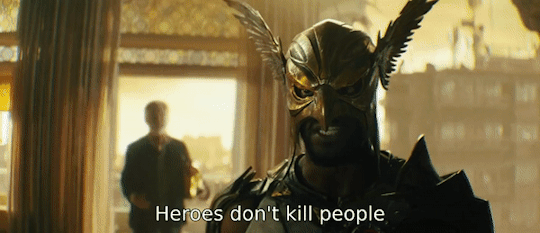
1. THE RESPONSE OF THE OPRESSED
Before I start, I would like to clarify as briefly as I can some terms and concepts that I consider necessary to begin to understand decolonialism and the response of the oppressed, a term that was coined in the famous quote by Jaylen Brown during the height of the BLM movement, "Do not confuse the response of the oppressed with the violence of the oppressor".
Pierre Bourdieu differentiates the violence of the oppressor into two categories:
explicit violence – in which the action of the dominant subject is visible (and therefore, in our current society, subject to questioning and legal or moral limitations)
and symbolic violence – conceptualized by Bourdieu when he addressed the issue of male domination in society and all the faces in which it presents itself – and we see it everywhere, from racial demographics in income distribution to that homophobic joke your uncle always makes.
This relationship of systematic domination can be understood as a chain, and in view of the necessary rise of awareness and consequent rupture of this chain, Audre Lorde presents the uses of anger.
By connecting the idea of symbolic power and the breaking of the domination relationship with the use of anger, we have the explosion of a natural reaction of the oppressed triggered by centuries of imprisonment in their own fear and, bringing this reality specifically to colonial relations, using anger over your own fear results in liberation. (source)
And although it wouldn't hurt to address the revolutionary terms in its most famous roots in the French Revolution and etc, here it seems more fitting to comment on Marx. And class struggle.
Briefly, Marx and Engels saw revolution as the result of organized political action by the exploited. Therefore, one can only speak of revolution when there is a rupture with the old political, social and economic order; and in its place, new standards of social relations are established whose principle is to ensure freedom and social equality among men.
This is what we mean when we talk about inverting the social order, and Marx will also use the terms infrastructure (productive forces + relations of production) and superstructure (politics, police, army, law, morals, religion, etc.).
The superstructure, for Marx, is created by the most favored and dominant class, but determined or conditioned by the infrastructure.
Therefore, the revolution would happen when the working class (and in that logic, any oppressed group) reversed the order and took control of the superstructure.
In short, this can be understood as the basis of revolutionary thinking.
Now apply this to the invasion, colonization and genocide scenario, and you'll see where I'm going here.
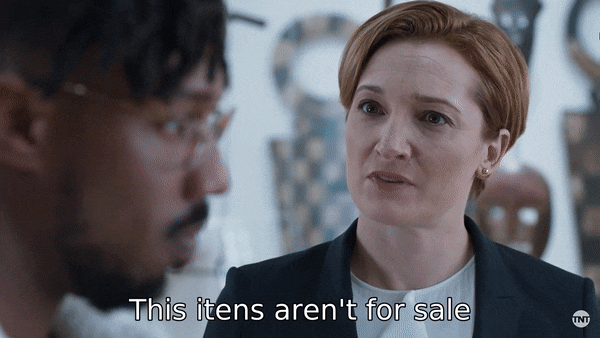
KKKKKKKKKKKKKK THAT'S A BIT EXTREME EXAMPLE SORRY but actually in Black Panther I the plot could very well be read through Marxist lens (and that has certainly been done), but I won't even go into that here, god forbid Wakanda Forever hahahah imagine that, anyway going back to my thread
2. ARMED STRUGGLE
A quick definition of armed struggle, which can be found in dictionaries, is armed resistance against oppressive regimes. In the armed struggle, the militants understand that the situation of society requires drastic action so that it can be modified, and for this reason they decide to take up arms and declare war on the oppressive regime. Guerrilla warfare is an example of armed struggle.
In the armed struggle, a group of militants opposed to the current regime in a given society, organize actions that can be strikes, attacks on barracks or public buildings, etc, aiming to destabilize the current power with the aim of overthrowing it and placing a different regime in its place, like a democracy, for example – in general, the armed struggle follows a leftist tendency. (source)
In Brazil, for example, the armed struggle appeared mainly as resistance to the Military Dictatorship between 1964 and 1985.
All of this goes along the idea of using violence as resistance to oppression (as already pointed out before): fire is answered with fire. In the specific scenario of the guerrilla, the French philosopher, journalist, former government official and academic Jules Régis Debray writes the controversial book Révolution Dans La Révolution, where he points out that "The main objective of a revolutionary guerrilla is the destruction of the enemy's military potential"; the enemy is stripped of it's military power (it's weapons) to ensure a greater chance of victory.
"To destroy an army you need another army.", Debray says. "Precisely because it is a mass struggle, and the most radical of all, the guerrillas need, in order to triumph militarily, to gather politically around themselves the active and organized majority, since it is the general strike and the generalized urban insurrection which will give the coup de grace to the regime and destroy its latest maneuvers - last minute coup d'état, provisional junta, elections - by extending the struggle throughout the country." (source)
Does that all ring a bell?

Sure it does.
Now, these are all historical scenarios, and nowadays the moral debates about armed struggle have become extremely more complex (as they should), and the disarmament discourse is taking more and more space in these debates. Is armed struggle the only solution? Wouldn't there be others?
But it is still a complex debate. The Brazilian rapper (and political thinker and, dare I say, philosopher) Mano Brown, a strong advocate of disarmament, staunchly defends that violence, most of the time, bounces back on the oppressed, not the oppressor.

Look at him all precious
He argues, however, that one cannot simply condemn the oppressed who react violently. Already in 2006 he presented in an interview that:
"I am in favor of disarmament, but this argument is difficult, things should be done differently […] People are coming as a class struggle, you know? Rich people don't want poor people to arm themselves and remain unarmed. And poor people don't want rich people to arm themselves and remain unarmed. Did you see the kid's argument: "How are the police allowed to carry guns while I remain unarmed? " It's kind of uneven. It's confusing."
(source - translated by me)
Mano Brown is part of the Brazilian rap band Racionais formed by 4 black men from the periphery, who revamped their music after realizing that it could be used to foment violence. They front a series of social programs, and revolutionized the way peripheral music is seen and consumed. Nowadays, in 2023, Mano Brown hosts one of the biggest political interview podcasts in Brazil (having even interviewed Angela Davis), is considered one of the most active leaders of the racial struggle, and along with the other members of Racionais, has taught open classes in estate universities.
The Brazilian educator and philosopher Paulo Freire, considered one of the most notable thinkers in the history of world pedagogy, inaugurates in his book Pedagogy of the Oppressed (you can read it translated right here) the idea of the liberation pedagogy. He strongly emphasizes that liberation pedagogy is a political process that aims to awaken individuals from their oppression and generate actions for social transformation – through education.
NOW WITH ALL THAT IN MIND WE CAN FINALLY MOVE ON TO WHAT MATTERS,
3. THE MOVIES
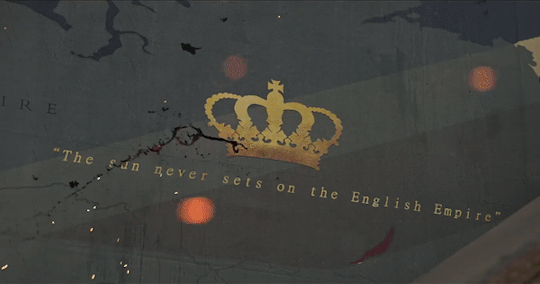
I'm going to talk about RRR here first because it makes me happier, but for reasons of time and your patience I'm not going to extend myself so much in the analysis of this film technically, and if you want a more detailed look at the grandeur and the importance and the genius of this film, please watch any of the many videos that are now appearing on youtube on the subject (I recommend RRR: Make Movies EPIC Again, by Jared Bauer, and The Importance of RRR, by the wonderful Accented Cinema)
ONCE AGAIN ATTENTION FOR BIG, MAJOR SPOILERS AHEAD
The story therefore revolves around two men: Raju, who infiltrates the British army to steal fireguns and deliver them to the people's guerrilla, and Bheem, a Gond leader who is after Mali, a child of his people who was kidnapped by the British to basically serve as a pet.
They meet under false identities, and unaware that they were both fighting for the liberation of India (through different methods), the two men form an extremely strong bond of love and friendship, which results in their struggles coalescing into an evocation of patriotic unity and popular resurgence against the colonial forces.
First of all, RRR is a fictionalized biography of two real-life Indian revolutionaries, Alluri Sitarama Raju and Komaram Bheem. So, in real life, Alluri Raju actually stole guns from the British to stage uprisings against the British Raj, and Komaram Bheem really was a Gond revolutionary leader who coined the slogan Jal, Jangal, Zameen (transl. Water, Forest, Land) wich became a call to action for Adivasis (or Scheduled Tribes) peoples.

You can see the flag in the last scenes
This "historical aspect" (in addition to the incredible, completely impossible and impossibly glorious action scenes) makes it plausible to draw parallels between RRR and Tarantino's historical revisionism films like Django Unchained (2013) and Inglourious Basterds (2009), where in all cases we see scenes of extreme violence that somehow feel justified, or cathartic, for being directed against oppressors (slave masters, Nazis, British colonizers, etc etc)

The parallels are just there.
Black Adam, on the other hand, states in its synopsis that "After nearly five thousand years of imprisonment, Black Adam, an anti-hero from the ancient city of Kahndaq, is released in modern times. His brutal tactics and righteous ways attract the attention of the Justice Society of America, who try to stop his rampage by teaching him to be more of a hero than a villain, and they all must band together to stop a force more powerful than Adam himself."
So we have a superhero story set in the present day in a fictional country on the Sinai Peninsula (that means, right there besides the Gaza Strip and the Suez Canal), occupied by a mercenary crime syndicate called Intergang, who brutally oppresses the Kahndaqi people while robbing their mineral resources. All good, all great.
But as stated in the synopsis, the film's great moral conflict revolves around whether the use of violence against mechanisms of oppression is justified or not.
Basically,

And while these two scenarios may seem similar, the approach the two films take to this debate, which, as I've said before, is EXTREMELY DELICATED, and EXTREMELY COMPLEX, is completely different. Firstly, because RRR is the only one of the two that treats it as, well, a debate.
From the beginning, RRR establishes the two characters as essentially polar opposites; Raju is fire

Look at the scenery with the european buildings in the background
Bheem is water
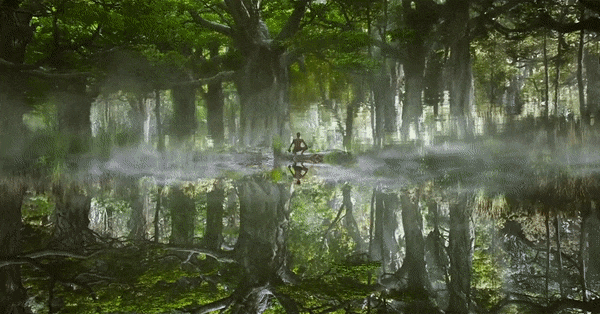
And here, the native, untouched forest with pure cristaline water
Bheem is the god Bhima, immovable, patient and resilient
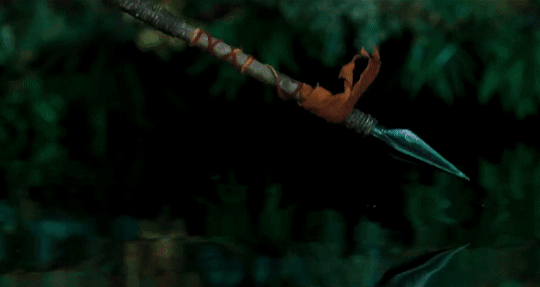
(like water)
And Raju is the god Rama, heroic, springy and skillful
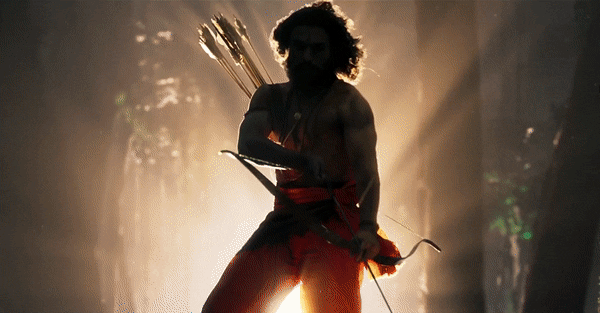
(and hot)
Bheem is the legs (the foundation) while Raju is the arms (the action)
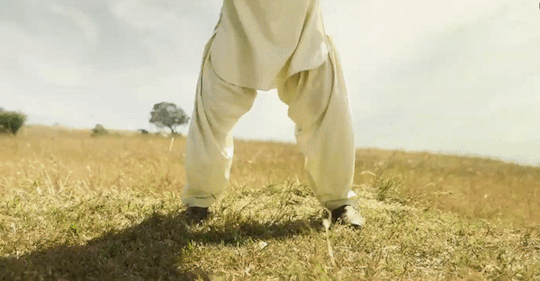
They ✨ complement ✨ each other
And this is translated into their different approaches to the revolution: Raju with his arms policy (inherited from his guerrilla father), who operates within the system to overthrow it, and Bheem with his native philosophy, using the land, the fauna, the culture, the religion, the people themselves as agents against oppression, operating from outside the system to overthrow it.
At the beginning of the film, Raju dresses Bheem in western clothing so that he can attend a British party (which allows him to know the building and locate Mali), and at the end of the film, Bheem dresses Raju in the traditional clothing of the god Rama, and arms him not with european firearms but with a sacred bow and arrow, evoking his native homeland in what configures the real defeat of the colonizers.
Not even getting into the merits of comparing these two films technically, just talking about the discourse itself, what for me fundamentally separates RRR from Black Adam, and even Django and Inglourious Basterds, is precisely Bheem's character. It's the other way to fight (but fight nonetheless)
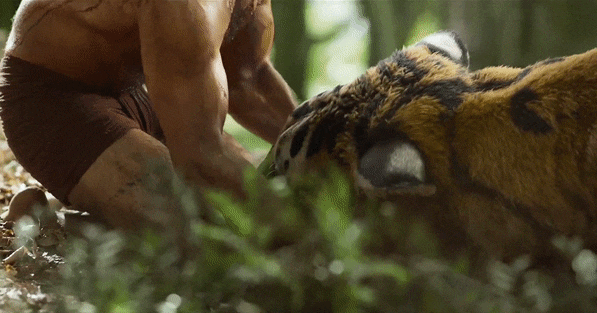
This does not mean that the armed struggle is delegitimized, or diminished. On the contrary, it is explained, justified (within that historical and social context) and respected. People who fought in the armed struggle, and died in the armed struggle, are honored and respected. It allows you to understand where the idea of arming the population is coming from (in a certain parallel with Mano Brown's interview that I mentioned above), but it also presents other discussions on the subject, that happened at the time, and still happens today.
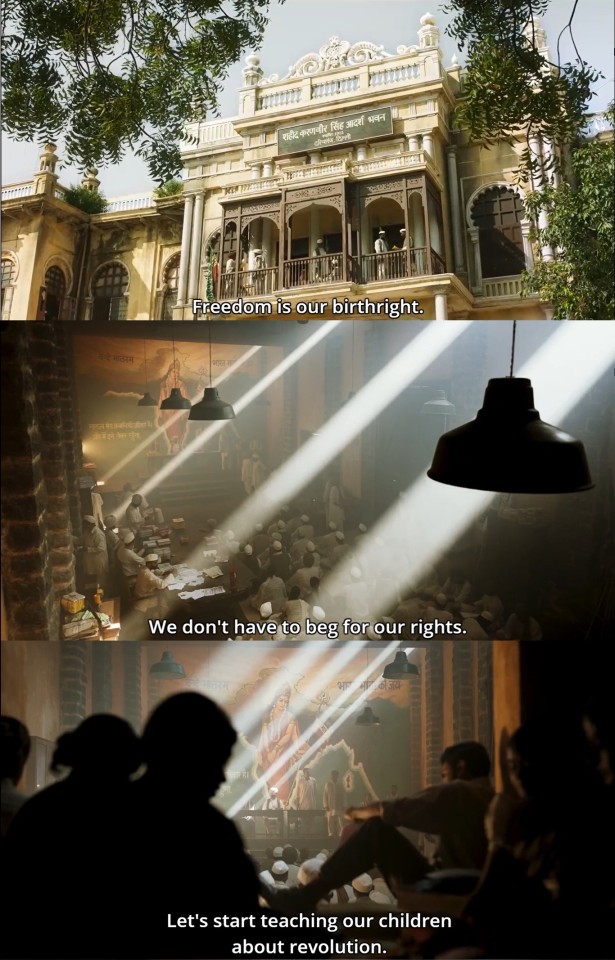
And above all, as I mentioned before, the film presents and reinforces the idea of inspiration. Even if education is presented only very briefly, in a popular assembly, in the long term, the film still gives extreme focus to the importance of raising awareness among the oppressed people.
This can be clearly seen in the scene where Bheem is being tortured in a public square by the British government, and refuses to kneel.

So when the torture becomes too much to bear, he starts to sing

Now, this is the most important scene in this movie and I'll die on this hill
And then, this happens
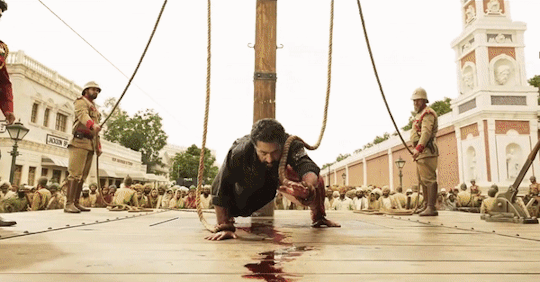

Bheem inspires not only the population, but also Raju, who even after years of enticement by his own father, steps back on his original (armamentist) plan when he realizes that "I was under the impression that guns would bring us freedom. But Bheem inspired a whole crowd with one song"
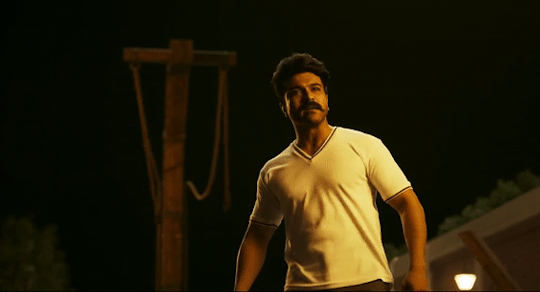
Even though in the context of the film the "path of choice" was still violent (this still is, after all, an action superhero movie), the message of this scene is extremely metaphorical. The idea of a song (art) inspiring all people to "become a weapon" against an oppressive regime is very powerful, and it resonates deeply in anti-opression movements all over History. It is, literally, the power of the people.
Furthermore, at crucial moments in the plot, both Bheem and Raju put aside their collective struggles for the other's individual good; Unlike his father, who readily accepts the militarization of his child son for the greater good, Raju, when questioned by his guerrilla companion for abandoning 15 years of work to save Bheem, says that "I will bear it for another 25 years, but I won't sacrifice Bheem for my goal".
Bheem, here, represents not only the friendship and love between them, but, metaphorically, an entire ideal of the people. Ultimately, one can say that this film addresses the idea of "what are the limits in my revolution": I will not sacrifice the other for my revolution; the limits of my revolution must be the wellness of the other (and in our metaphorical reading here, the wellness of the people).
Parallel, the torture scene can be metaphorically read as: the only valid sacrifice is my own, never that of the other. (and I won't be commenting on the revolutionary character of ideas like martyrdom and self-sacrifice, but yes). That's what Bheem and Raju do throughout the entire film, they put the other above themselves.
And in the end, they kill the british defeat oppression together✨
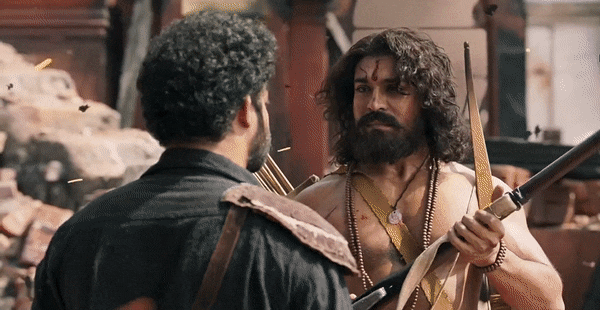
Now, as I've mentioned before, yes, this movie still ends violently, yes, it still glorifies and celebrates this violence in some of the best action scenes I've seen in my whole life, yes, it is heavily patriotic and sometimes a little bit too on the nose about it, yes, and did I rejoyce in it? Yes.
But it cannot be denied that RRR at least presents a reflection not often seen in films of the genre, which is the mere existence of real debate. In addition, the film is placed in an extremely specific historical context, portraying real historical figures, real life revolutionaries, folkloric parallels, a gigantic symbolic charge, in short, a whole other deal.
Besides it, the only difference between this film and idk, Braveheart, or Star Wars, is that in this film the social and racial parallels, the guerrilla warfare and class struggle (and the colonial wound) become clearer – and perhaps this is a more responsible way of representing a revolution.
NOW, BLACK ADAM ON THE OTHER HAND KKKKKKK
As mentioned in the synopsis, the background of Black Adam is curiously similar: we have an oppressed people, we have the militia, a clear racial reference to a real-life conflict, which affects thousands of people daily, and the figure of a mythologically evocative hero with super powers who will free the people from oppression through violent means. And yes, there is debate: we have the Justice Society, which condemns Black Adam's methods and questions his use of violence, only to be proven wrong at the end of the movie.
But the "proved wrong" isn't really built, or developed (as Intergang is quickly forgotten when they all start fighting each other and then… Satan? For some reason??), and it basically boils down to this:
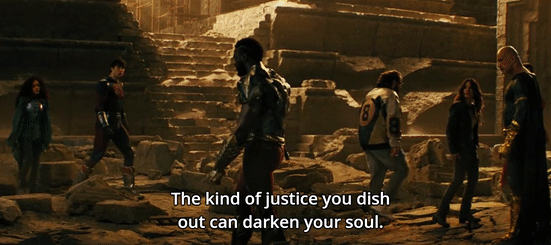
KKKKKKKKKKKKKKKKKK
And that's so funny because he actually just… killed like 3 soldiers in the second act of the movie. That's all he did.
And it gets even funnier because at some point we have a scene that genuinely makes a VERY VALID point that made me very hopeful when I was in the theater watching it

Like, this is SO VALID and she is SO RIGHT and this is such a great argument and a great debate point and then it just... goes nowhere

He just killed like 3 guys he didn't even talk to the people he just, quite literally, killed some pawn soldiers and went on to fight his own individual battles that had nothing to do with the actual opression state of the country besides them telling you that "it was bad".
The problem with Black Adam's is ac how shallow the argument is. Nothing is justified, nothing is not even debated, we just have Hawk Man going "killing is bad" and Black Adam going "yeah but I do it caused I'm disruptive like that", and even when we have this "inspire the people" moment is just... this kid with a cape doing this symbol and yes, symbols of struggle are a great tool in fighting oppression, and yes they work and they're so, so great, but this one specifically kind of just…was there?
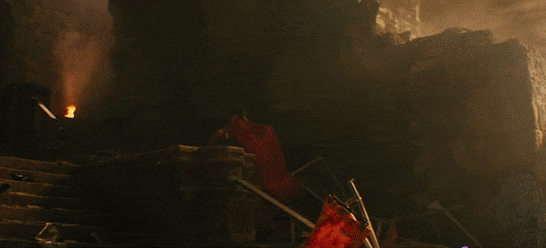
LIKE OK THIS IS ALL GREAT but then it lead to people… fighting zombies?????
zombies ??!?!??!!!????
Like, how, seriously, how does this have to do with any of your previous state of opression? How does this change absolutely anything??? Are we going to have elections after the zombies thing, or... ?
And that, to me, is such a poor and wasteful way of representing people power that, even though I didn't take this film seriously, I couldn't help but feel mildly frustrated. Much of the recent wave of blockbuster media about decolonialism, in my opinion, has been making this same mistake, which is apparently thinking that just because a movie is made to be a blockbuster, or a superhero movie, or an action movie and easy entertainment, it cannot tackle complex topics. It cannot deepen a discussion. It can't take 10 minutes off a fight scene to establish a full dialogue. As if that would, idk, tire the audience maybe? Idk.
As if a universe of superheroes, or fantasy and action, couldn't contain a scene like this:

This scene seems so simple but it is so, so huge
Andor is perhaps an example out of the curve, because Andor is a series that makes a great effort to represent the fight against oppression in a very serious and responsible way, making it its main theme, of representing what a fascist government is,how a fascist government acts and affects all layers of a population, what is the immigrant cause, what is the armed struggle, what is it like to be a person of color in an far-right government. And it does all of this in an unprecedented way in the genre so far, indeed.
But as I said before, perhaps this should be how all media represent these themes. Because otherwise, even the best of intentions can turn against the causes you sought to defend. And ok, I know that Black Adam is "just a superhero movie" and that maybe it's unfair to demand so much from a movie that only came to propose a simple entertainment with fight scenes and jokes, and I had fun watching it indeed. I love Dwayne Jhonson we all do. But the thing is, if you're going to represent that debate, I genuinely believe it can't be done as simply, or as poorly explained, as it was in this film. A poorly presented arms discourse can become an attack on the legitimization of the armed struggle in its historical context, it can become a justification for a shootout against anti-oppression demonstrations, it can become the excuse for why a policeman mistook an umbrella for a rifle, or a piece of wood for a gun, and killed innocent (and peripheral) men.
In the best of scenarios, the intent is simply forgotten, or it's so hidden in the metaphorical layers of the work that it's easy to miss them. If that weren't the case, there wouldn't be so many racist, misogynistic, right-wing Star Wars fans, for example (just to be clear, I'm not attacking Star Wars here at all, ok, I'm just using it as an example – you'll agree with me that I've never seen any Cambridge professors attack Star Wars)
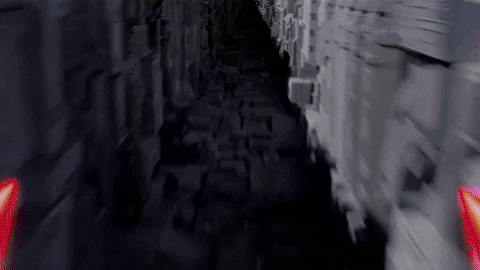
And fair is fair, Luke did explode a moon-sized military base full of millions of people and all that...
SO ANYWAY
Armamentism is an extremely serious issue, and it must be handled very, very carefully. As I mentioned before, RRR has a historical context, and an argument builded throughout the entire film; I hardly think anyone comes out of RRR, or WomanKing, wanting to pick up a gun and simply shoot someone (I hope). But the way this idea was presented in Black Adam, it is not an exaggeration to say that someone might have had this impression after watching it. At the very least, the movie took no care making sure this wasn't the case, and that for me is troubling enough.
The struggle against oppression and decolonialism are extremely important topics, and I am happy that these themes are increasingly making themselves present in more and more media works (and we have had several very good ones recently) – and Black Adam does have good ideas in the middle of the mess. But if you're going to make a film to talk about oppression, without actually commiting to approach it responsibly, why do it?
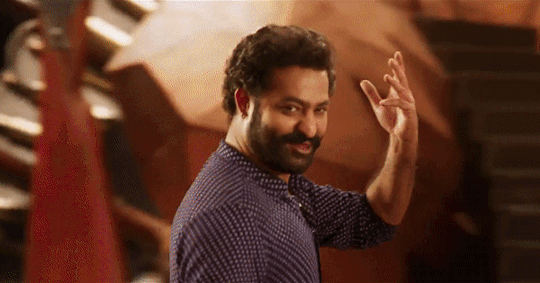
And ok, RRR does have a very imperative call to action but well, look at them, would you not answer???
#decolonialism#rrr movie#rrr#black adam#dc#dc universe#indian cinema#guerrilla I guess#star wars#andor series#andor#marx#marxism#killmonger#black panther#dwayne johnson#response of the opressed#racisim#movie essay#movie gifs#revolution#antifascism
150 notes
·
View notes
Text
Remembering Tumblr is a place of art, writings and ideas. So here's an entire ramble about the Jurassic Park movies and why the inaccuracy of the dinosaurs is a part of the plot
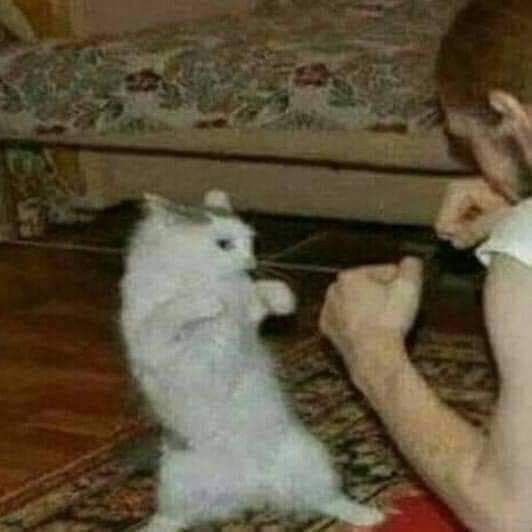
Anyways so the movies revolve around dinosaurs and stuff right? The usual plot points are always there, but it's a sci-fi thriller movie about dinosaurs and people tend to forget about the whole sci-fi part. I mean the scientists created dinosaurs but never had the complete strand of DNA as stated in the first movie, leading them to replace the rest of it with frog DNA by filling in the gaps. Which later turned into a whole problem in itself with the thing with the fact that they can breed by switching around a few things with their gender, similarly to some species of frog when faced with a female dominant environment.
Such asssss the dinosaurs ‼️
But the whole problem wasn't the dinosaur DNA, nono it was the frog DNA being mixed around with others to fill in said gaps.
It's my leading point as to why I don't understand why people hate Jurassic Park simply because the dinosaurs aren't accurate, when that was the whole POINT.
They ARENT dinosaurs.
They're amalgamations of different DNA strands combined to RESEMBLE a dinosaur, with maybe a little dino dna in place to create a base. And in later movies revealed to be even more fucked up combinations of DNA to keep the publics interest.
They're monsters made to look like dinosaurs, where intelligent and dangerous are key factors that the scientists like putting into creatures that weren't meant to exhibit such thoughts at such a level.
The premise of these animals in the movies was always "Are they actually alive?"
Because yes dinosaur, but also not dinosaur.
They're talked about constantly like objects, even though they are very much alive and living. Yet are constantly in a state of being created to look and act scarier in order to keep the quota that they're nothing but assets on a building board.
But really the scariest part is "Oh, what's scarier than teeth?"
Teeth and intelligence.
As the movies move on, these scientists create the dinosaurs to be stronger and smarter. Feeding into the amalgamation with the idea of a dinosaur in order to create what would be a marvel; not a stability.
Instead of mindless killings, the dinosaurs are aware of what they're doing. Which is considerably worse than if they ever were just instinctual actions.
Both Jurassic world movies had at least someone point something out, basically just saying that the splices of DNA weren't real dinosaurs.
Notice how it's quite often pointed out with subtleness of a simple sentence yet is used to determine the point of the movies. That once again, they aren't dinosaurs.
Both Indos were there in order to bring the plot point to closure, making it simpler to understand.
That amalgamations of DNA will never be a real dinosaur no matter how much it resembles one.
The books did a much better job getting this point across though I must say, as they enjoyed bringing the horror aspect of it all there. Just showing even more how they're obviously lab created monsters.
Anyways shout out to all the little kids out there who were absolutely convinced the dilo could spit venom because of Jurassic Park. (Me fr) 🥰
13 notes
·
View notes
Text
Rewatching Treasure Planet for the 1000 time so here are my brain brrr thoughts/ things i noticed...
• During the opening scene where Jim is freely Solar Surfing the area, the music that plays over it comes back again in different tones: when they take off from the spaceport, when escaping the supernova and when Jim saves them from the planets destruction and that's pretty poetic
• I was thinking "why are they the only humans" but then why is anyone one species. I dont think you see 2 of the same species around. It also makes sence since they own/work at an Inn and the movie takes place on other alien planets
• Amelia from the start clearly states she doesn't like the crew Delbert hired, yet she doesn't push for him to hire a new crew or anything. She maybe be the captain and a really good one, but in a way (despite what Delbert says) she does know who she's working for
• Amelia and Arrows' whole dynamic. "I said something rather good before coffee" (- Amliea) they're besties
• Doplers bulky suit runs on 3 AA type batteries 😂
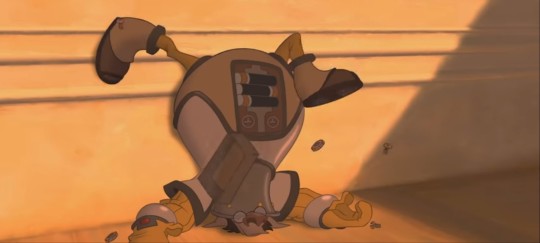
• When Silver said to Jim "I have two new friends I'd like you to meet" before he revealed it was a joke to do chores, Jim looked genuinely interested in new people to meet. He's finally on a spacing adventure that is based on his favourite legend since childhood and he gets back to doing more things he was doing at the Benbow, so I think his disappointment is some what valid
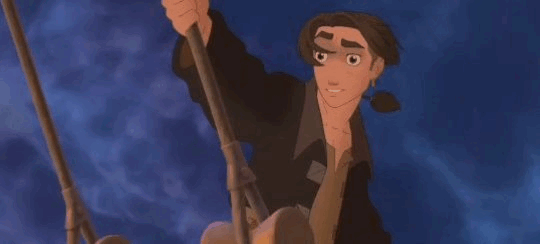
• Silvers crew either severely sucked up and faked their resumes and/or took out any competition to get that job, which is why they got the job and not a better crew
• Jim built his first Solar Sufer when he was 8 and probably did it as a way to be closer to his dad (I think he was still around at that age)
• In the flashback of his dad leaving, Jim woke up startled and worried. It then cuts to his dad already walking away then his mother crying at the table, so they probably had a massive fight as he was leaving which woke Jim up. They probably fought a bit before hand as well
• Morph turned into a wrench to help Silver, so Morph can hold the weight/strength of things he shapeshifts into
• Its been pointed out that Jim's cloths are a symbolism of his development. He starts with a black shirt and jacket then a tan shirt and black jacket and by the end its just the tan shirt.
He gets the tan shirt and black jacket when they start the voyage, but loses the jacket part way through the "I'm still here" sequence. He wears it again after Arrows death then loses it again when Silvers true intentions are revealed to him.
• Jim and Silver did fasten their lifelines after being told to - during the supernova - but they had to undo them to get the sail at the front of the ship. So if Jim hadn't caught Silver when he fell, even his lifeline would t have helped him
• When bracing themselves for the last Migella in the Supernova, Silver holds Jim and the pole, looking down to make sure he's ok
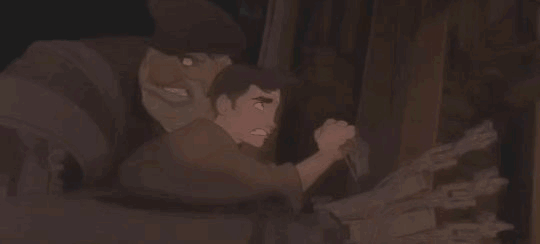
• At the start of the movie Jim uses a Purp to sus out Silver, and its the same Purp barrel Jim is hiding in when he overhears what Silver says to the crew
- Jim using the purps to try and hint that he's onto Silver vs Scroop using the purp to emphasise that Silvers gone soft
• Treasure Planet was using drabooln currency before tiktok deemed it cool
• The parallels in Arrows and Scroops deaths.

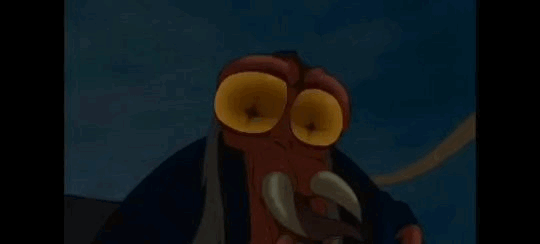
Bonus cause:
Scroop: Do say hello to Mr Arrow
Jim: Tell him yourself!
• When trying to find the gate, the crew threaten to kill Jim but Silver looks worried. When he says "I suggest you get the gizmo going again and fast!" It was more a warning, cause he looks scared for Jim when they prepare to attack him...

• B.E.Ns eyes going from green to blue I think is a little clever bit of symbolism. They started green which was the colour of Treasure Planet (map, portal etc) and then when he got his memory circut back and could help them get out, they changed to blue
• Morph, Morphs into things around him, which is why he copies what people say, he's Morphing/copies their words
• When Silver is saying goodbye to Jim he smiles up at him, showing his non cyborg side
Hope you enjoyed, feel free to tell me your thoughts on this movie, that I feel normal about
15 notes
·
View notes
Text
So... The ending of Glass Onion was a metaphor for performative activism, right?
I watched the movie again recently, and upon watching the ending that was the conclusion I came to, and I would like to share this now.
Starting off, the "raise your hand scene", which I think is a great metaphor for activists (everyone but Helen and Blanc) who realize that the system (Miles) is terribly flawed but are still benefiting from the system, so they don't want to actually do what it takes to fix it. Everyone is obviously terrified of Miles, but as they said earlier, they are still holding on to "the golden tit", so they can't/don't want to testify against him.
Then of course there's the glass smashing scene. When Helen starts smashing the glass statues, it doesn't really affect Miles. So when the others see that there is a way that they can vent their frustrations and misgivings against the System (Miles) without actually jeopardizing their place in the System, they take it. But of course, this is all purely performative, as shown in my last point:
The Explosion. When Helen starts lighting things on fire, the Others immediately try to stop her. They were just supporting her when her demonstration didn't mean anything, but as soon as what she is doing actually threatens the System that gives them their benefits, or when it gets "scary", they are strongly against her. They even put themselves in active danger to try and stop her from hurting Miles.
But as soon as the damage is done and Helen has done all of the hard work, they are ready to raise their hands and testify against Miles. But again, it's purely performative. Miles is already ruined, and even with their testimonies the evidence of Andi's murder has been burnt, so other than being symbolic it really doesn't matter.
#movies#glass onion#helen glass onion#miles glass onion#essay#movie essay#analysis#activism#performative activism
65 notes
·
View notes
Text
Analysis of 2001: A Space Odyssey - Why David Bowman and Frank Poole are the villains of the story, and the plot's unfair treatment of HAL compared with the mise-en-scène
Oh and there's also a free little fanart for you at the end
A man can only justify his actions if he regards his demeanor with deductive thinking. This man was not David Bowman, nor was it Frank Poole, mainly because they were both fucking douchebags.
Many people, thanks to how the conflict of the Discovery One part of the movie is framed, come away thinking HAL 9000 is an entirely villainous character, owing to the film’s tight-lippedness regarding why HAL takes the actions that he does. In most people’s eyes, it’s a straightforward story of “Machine malfunctions, goes homicidal, and needs to be shut down.” Others who see HAL more sympathetically, especially given that his reasons are much more fleshed-out in the novelization and subsequent movie, tend to think that, while it wasn’t HAL’s fault that he had to resort to homicide, it was a situation in which nobody was in the wrong. However, people who think more closely about the progression of events leading up to HAL’s murder of the crew can only find the conclusion that HAL was the unfortunate victim of this segment of the tale, and that Dave and Frank were decidedly at fault in the whole ordeal, if not villains outright.
Thanks to HAL’s murder of the crew once Dave and Frank decide to shut him down, most come away with the impression that HAL was plotting betrayal from the start. Even those who knew HAL was only trying to ensure the success of the mission look at HAL’s betrayal as an inevitability rather than an act of desperation, due to his increasing paranoia. When the truth is, the catalyst for HAL to take such drastic action in the first place is when Dave and Frank discuss their plans to disconnect him, behind his back, no less. Even if one doesn’t take into account that HAL had never been taken offline before, however you believe he saw being disconnected, it’s still easy to see how HAL could’ve felt betrayed by the two. Up until that point, he’d been nothing but helpful toward the two. Even when he made his failed prediction of the AE-35 unit’s failure, he never made any attempt to stall or work against the crew; for all intents and purposes, he was perfectly helpful even when he was ‘in error.’ His method of satiating his own worry was never murder, it was a distraction, which, while relatively harmless (since HAL was capable of carrying out the mission himself, presumably in the absence of mission control also), would get at least one pair of eyes off his back, that being mission control.
HAL’s benign and non-lethal first approach when dealing with paranoia is in stark contrast to Dave and especially Frank. When they receive the report from mission control that HAL was at fault in predicting the error, they automatically feel the need to go behind HAL’s back and discuss their plans to disconnect him. This move is, to put it bluntly, extremely troubling. From a logical standpoint also, because they had no way of knowing whether the risks and difficulties would be worth it from only one relatively benign failed prediction, or whether those failures would ever increase to the point of being a danger to the crew, but more importantly: Dave and Frank fully intended to essentially lobotomize a sentient being out of what amounted to paranoia over a single error. The defense that they didn’t know with certainty whether HAL was sentient or not only goes so far, since, as men of science, judging by the massive amounts of evidence towards HAL’s capacity for emotions—that even they acknowledged—they should’ve acted with the possibility of HAL being sentient in mind. Their choosing to disregard the possibility of HAL’s sentience in response to a simple error, to the point of cutting his higher brain functions, is, to say the least, extremely chilling.
This demonstration of cruelty on Dave and Frank’s part is simply the ultimate of a larger issue, shown over and over again, the issue of their disregarding the idea of HAL’s sentience, even the idea that HAL is anything more than a computer. This theme is represented succinctly, yet strikingly, in the interview near the start of this segment of the movie, in which the reporter is interviewing Dave, Frank, and HAL. From the line in which the reporter states the HAL 9000 computer can reproduce the functions of the human brain, pausing midway to state “though some experts still prefer to use the word ‘mimic,’” to the line in which Dave shrugs off the way HAL seems to express emotions as simply being the way he’s programmed; when juxtaposed with HAL’s demeanor during the interview, in which he seems happy to talk about his role on board the ship and the way he enjoys working with the other crew members, such comments seem cold, maybe even cruel, no matter how truthful the participants believe they’re being.
This issue crops up again when HAL talks to Dave regarding the circumstances surrounding the mission. Though HAL never drops his composed tone of speaking, one can clearly hear him hesitating when discussing the mission and the oddities about it, almost as though he’s grasping for anything to clue Dave onto the fact that there’s something wrong, and yet, Dave only dismisses it with “You’re working up your crew psychology report?” One can almost hear the disappointment in HAL’s reply to that, and considering his prediction of the AE-35 unit’s failure right after, even desperation to alleviate some, any of his anxiety, to clue the ones he considers his friends into the fact there’s something that he can’t say about the mission. Despite the fact HAL states clearly he might be projecting his own anxieties, Dave doesn’t see any meaning behind the words. In this respect, one can think of Dave’s failure to consider HAL’s clearly-apparent sentience as the catalyst for everything going downhill.
“Never attribute to malice what can reasonably be attributed to ignorance” only works if Dave and Frank are about as dense as a black hole. And then again, even ignorance, at a certain point, becomes malicious.
It is sad enough that even the plot seems to fall into the same doubting logic as Dave and Frank, as the only evidence of HAL’s humanity and innocence is left for him to vouch for himself, while the story relegates him to the role of the antagonist, to the role of the malevolent, malfunctioning AI. (The word ‘malfunctioning’ would imply some loss of logic, and thus accountability, making ‘malevolent’ and ‘malfunctioning’ oxymoronic, which is a good summary of the plot’s victim-blaming of HAL.) And yet, for all the plotline slots him into the role of the villain, does the framing of the scenes tell the same story as the, well, story? For the answer to that question, the best place to start is the scene of the close-up of HAL’s ‘eye’ as he realizes Dave successfully managed to repressurize himself after entering the emergency airlock. Though he doesn’t technically show any emotion, the Kuleshov effect is what makes his inner feelings here palpable: fear. And watching the scenes that follow, what with the frequent use of red lighting, the jittering camera, the close-ups, and the frequent use of low-angle camera shots which are known to make a subject look larger and more imposing, it almost feels as though Dave is the slasher villain of a horror movie, and almost certainly, in HAL’s eyes, he is, and he tried to save himself for as long as he could, only to be powerless in the end.
Which all leads to the scene of HAL’s slow, terrifying deactivation. It’s this scene that reaffirms HAL’s struggle the most poignantly: struggling against being treated like nothing but a machine. And though his pain at having to go through with it may not clear him of guilt, it’s only in HAL’s deactivation that Dave finally considers his personhood, even as he’s forced to deactivate him, methodically, mechanically.
It’s only in death that HAL proves he was always ‘alive.’ And yet, in 2001, he never receives his vindication.
Leave it to Kubrick to make a film that makes you reconsider the dissonance of the plotline and the mise-en-scène so deeply.
Oh, and, for reading so far, here's your image! ❤
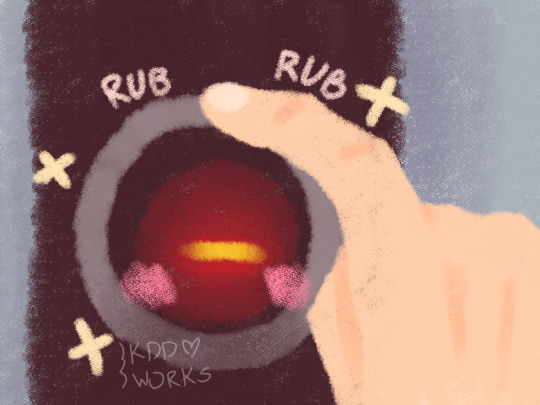
51 notes
·
View notes
Text
ummm so puss in boots the last wish is a masterpiece??
Okay spoilers ahead obviously. You've been warned.
So I've dealt with intense anxiety and stress over the concept of death for a few years now. Most days it's fine, but sometimes something gets set off in my brain that sends me spiraling into a state of intense panic over the idea of death, or, to put it more accurately, eternity. As a follower of Christ, I know deep down that death is not something to fear bc when I die I will immediately be taken to spend forever with Jesus, who gave his life for me and spared me from the snares of sin and gave me an invitation into His kingdom. Logically, I shouldn't fear eternity. Unfortunately, as long as I'm living here on earth, I'm stuck with a limited, imperfect human brain that cannot possibly grasp the concept of life with no end, and can't imagine how I could possibly have eternal joy that doesn't dwindle, and can't get used to the idea of not getting bored. My limited mind leads me to think that life will be boring and lonely in heaven bc my family may not be there with me for years if I go before them, etc. idk if that all makes sense but basically, even though eternity in heaven is usually a wonderful concept for me, my fear of the unknown and the limits of my human brain end up triumphing over the joy of that idea.
We see Puss break down in an intense state of panic over death multiple times in the movie, and every time the memories of his life flooded through his mind during those panic attacks, I started to cry bc I do the same thing. When I'm having an anxiety attack over death I think about my sisters, my childhood, my friends... everything I'll be missing when I die. And even when I'm not thinking about death I so often reflect on my childhood and get so depressed on how all these years have gone by and I'll never get to revisit them, never get to relive the wonderful memories I have of the past. My heart was racing just like Puss' when I witnessed his anxiety in the movie bc I was seeing myself in him the whole time, and I knew exactly what he was going through and how he was feeling.
And then we get to the ending of the movie, and I'm telling you, I genuinely thought Puss was going to die. I was so invested in the movie and felt like I was right there with the characters, and found myself saying, "Don't be afraid of death, Puss." And that was when it hit me. I was telling this fictional character the very thing I've needed to tell myself for the past three years. (That's also when I broke down sobbing in the theater lol).
It's okay to be afraid of the unknown. But I can't let it consume me. A life spent constantly worrying about death and how I'm getting closer to it with each passing day is never a life well spent. And I know my fear is really my human thoughts getting in the way and the enemy using anxiety to prevent me from feeling the joy I should feel over eternity, though some days it's harder to find the strength to overcome those things. But I've found that prayer and reading scriptures about fear really help me through those anxiety attacks. God is so amazing and I know in my heart eternity will be wonderful! Sometimes I have to use tangible things my human mind can wrap around to help ground myself, and even if they don't compare lol. But yeah, I know this is something I will be able to conquer, and I know heaven is beyond what we can imagine and isn't what my human mind paints it as when I try to imagine it.
Anyway, I felt like applauding in the theater after watching this film. Those who worked on this movie, thank you from the bottom of my heart for giving this to us. I don't think I've ever felt so seen while watching any movie, let alone a DreamWorks movie about an anthropomorphic cat lol. I just know this will be a fave of mine forevermore, and after the Bad Guys and now this, I can't wait to see what else y'all have up your sleeve.
1000/10, can't believe Puss in Boots 2 dethroned Megamind as my favorite DreamWorks film.
#movie ramblings#puss in boots the last wish#puss in boots#well done dreamworks#you had me both cracking up and having an emotional breakdown over this one#dreamworks#movie essay
18 notes
·
View notes
Text
So I watched Avatar for the first time (I know, catch up already, amirite) and...
Hoo boy...
Where do I even start.
Don't get me wrong, it's a beautiful movie. It's a set right out of the deepest pits of my imagination; it hits all the positives of fantastical sci-fi with a subtle backdrop of dystopia. The Na'vi serve a beautiful fantasy down-to-earth element while humanity portrays a message of technological takeover. And we must remember that 2009, hell, basically anything pre-2016 or so, didn't often have open political messages, especially a message about white colonization of the indigenous.
But.
And it's a big but(t)
(couldn't help myself sorry)
It's only great up until, like, the last 50 minutes or so? I think you know what I'm talking about. It's a nice story about a people coming together to face the imminent threat. But it's a fucking native vs colonizers story with a goddamn white savior. What did Jake even do to actually earn their respect? Sure, the Eywa chose him and all that, but what the fuck does that even mean? It literally gives "eh, the natives weren't good enough so I blessed this white man instead."
(dropping in a point here to remind you that it isn't just because Jake is a white man, it's that he's a man at all and not a Na'vi native).
It's not a good look for James Cameron.
Wanna become native? Uhhhh.... just dress like them for a couple months, learn about 5 sentences of their language, and have sex basically in front of a shrine to their goddess.
It's...
It's just dang icky.
The story would have been easily a thousand times better had they had Neytiri (AKA the beautiful Zoe Saldana, a black woman and Na'vi native in the film) the true hero and Jake as... basically a kind of collateral damage. Maybe his former marine and informant status could've ended up inspiring her with ideas for war tactics or something. And shit, it would've been such a sick fucking plot twist for the hero of the first half to suddenly become lowkey redundant because he isn't a goddamn native; they have zero reason to trust him. I mean, this asshole literally fucked the fiancé of the future clan leader! And he faces no consequences! It's giving Anakin Skywalker massacring children and being rewarded with marriage.
And it wouldn't make him any less of a main character.
He would still be a hero, just not the hero.
And then, ONLY THEN, once they've won, do they truly accept Jake as clan. As brother.
Imagine it: Jake tries to rally the forces of Pandora and... it doesn't work. Failure is upon them. It all looks hopeless. And then Neytiri, renewed with hope and a heart aching for revenge, steps up. And it's her that delivers the powerful speeches that inspire the clans because she is their sister, not some guy who's only been around for three fucking months.
But hey, what do I know?
#avatar#james cameron avatar#na'vi#film discussion#avatar critical#film essay#watching Avatar 2 next and my hopes are NOT high#colonialism#messages in film#movie review#movie essay#ffs james cameron stick to the cgi#let someone else handle the plot#science fiction#pandora be pretty tho#gonna drop in a sneaky#fuck anakin skywalker#anti anakin skywalker
12 notes
·
View notes
Text
Renfield
My dumb little gay brain has hyper fixated on this upcoming vampire film so I wanted to talk about it. Really long post under the cut, so read on at your own risk 👍👍👍
So Renfield is this movie about Dracula’s minion, Renfield, and I got really excited about it when I saw the trailer. I’ll probably still go see the movie, the aesthetic is cool and I like the colors, but based on that trailer, I had an understanding of the plot that did not pan out. Maybe I’m wrong and the advertisement was misleading, but as I’m aware of it, the plot goes like this:
Renfield is your average guy, save for one thing: he works for the narcissistic Lord of Evil, Dracula, who I think serves as a literal representation of his low self-esteem and self-worth. To help alleviate this problem, he goes to a toxic relationship counseling group, who see his panicked rambling about his boss’s powers as hyperbole. His job is to bring Dracula people to eat, and, in exchange, (by eating spiders??? I think???) he gains superhuman strength and agility. But Dracula treats him terribly, and he’s looking to get out of their bargain. He, at some point, saves a bunch of people, and teams up with a police officer lady to an unknown degree. I assume the movie will end with him defeating Dracula, symbolizing him overcoming his mental struggles and finding peace.
Now, I thought this movie was gay. Perhaps that’s my gaggles (gay goggles) talking, but given that he goes to relationship counseling, the bizarre intimacy shown in the promotional material, as well as my inkling that it would have its romantic/sexual undertones addressed narratively if either Dracula or Renfield was a woman, I think it’s justified. So my first thought was, “Cool! Gay vampire action movie with Nick Cage!” And then I thought, “Oh, not gay vampire action movie with Awkwafina.” And some of my initial enthusiasm dipped. But I figured, “I can’t’ve been the only one who caught on to these subtleties, right?” So, to the Internet I went.
Come to find out, almost everyone saw the very homoerotic subtext between the dominating evil fancy man and his submissive good-hearted henchperson.
Of course, some certain corners of the Internet, such as Pinterest, Tumblr, and Ao3 are perhaps a bit hardwired to see two men in close proximity and diagnose them with gay, but I think that says more about how writers write these characters, and less about how the fans see them. Since straight relationships are largely unappealing (read: unhealthy and possessive) as portrayed in modern media, and a majority of characters with speaking lines and interactions are male, gay pairings are an essential part of the shipping conversation. The top ten pairings in Ao3 fanfiction are all between two guys, for Pete’s sake.
So why aren’t canonical gay relationships more common? The obvious answer is, obviously, the aggressive heterosexuality of Hollywood, action movies in particular. Sometimes it seems like hetero romance is a quota to fill, as if while making these movies, they thought, “We have to make these to opposite-gendered characters kiss,” with very little reasoning or logic behind it. And even if a straight romance is given buildup and payoff, it seems that many writers are uninterested in actually writing about two people in love, beyond the falling in. (The Thor movies are actually a great example of this, as the relationship between Jane Foster and Thor in the first movie is a pretty well-written one. But then they’ve broken up in the second film, Jane isn’t in the third one, and then she dies.) Indiana Jones has three different love interests for three straight movies, Maverick gets back with Penny in Top Gun 2 for literally no good reason, and Endgame ends with Captain America having gone back and inadvertently removed Peggy’s agency to get his romantic ending. In my opinion, straight romances are largely superficial, not impacting plot or characters in meaningful enough ways to be included.
And that’s, I think, at the heart of why I can’t stand romantic subplots in action movies. Their superficially and toxic insanity. I can count on two hands the amount of movies with enjoyable and well-progressed romantic subplots. (Howl’s Moving Castle, Shrek, and Tangled come to mind, though that might be my animation bias showing.) It feels tacked on. Cheap. Unimportant. It’s hard to get invested into when the characters are so… not interesting. And when it’s not boring me to tears, it’s making me question the sanity of whoever signed off on it.
For an excellent comparison, look at the 1999 and 2017 Mummy movies. In the ‘99 film, Rick and Evie’s romance couldn’t be removed without substantial changes to the narrative. They positively drive each other’s development. Rick by feeding into Evie’s more outgoing and adventurous tendencies, and Evie by driving Rick to be more open and compassionate. They’re totally focused on each other, and time is given to developing their relationship naturally. It also provides a good foil against the villain, Imhotep, who was destroyed not once, but twice by his obsession with Anck-su-Namun.
But the 2017 version has one of the most heterosexual stories I’ve ever seen in an action film. The protagonist, Nick, has two love interests, the paranoid researcher Jennifer, and the mummy herself, Ahmanet. He’s linked to Ahmanet through some psychic BS, and she wants to marry him. But he also has a past with Jennifer, and ends up sacrificing himself for her. But instead of these relationships serving as juxtaposition, one driven by genuine caring passion, and the other driven by desire and selfishness, one just keeps getting in the way of the other. At the end, neither are developed or compelling. Too much time is spent with Nick bemoaning his ties to Ahmanet to grow into his relationship with Jennifer, and too much time is spent with Nick angsting out with Jennifer to elaborate on his relationship with Ahmanet. And they’re all such boring characters that you can’t even really bring yourself to care.
So, along comes Renfield. A film with the perfect opportunity to structure most, if not all, of its story around a romantic relationship, albeit a failing one. It felt (and still feels) incredibly What We Do In The Shadows, given the poppy neon lighting, dry-humored dialogue, timeless atmosphere, and campy characters. And, above everything else, a lot of very gay subtext. (Of course, What We Do In The Shadows is a lot more overt with the character’s obviously not-straight sexualities.) Because while the common Internet users seem to look at this movie and say, “they’re gay,” the more official, widespread Internet journalists and film critics seem to look at this movie and talk only about how cool it is that not-so-subtle meme king Nicolas Cage is playing a classy-classic tuxedo vampire. (And, don’t get me wrong, I love that too.) Is it the gaggles rearing their homo heads again? Is this just something we’ve read into too deeply?
I don’t think so. Any millennial/ gen-Z consumer of vampire media, excluding maybe the die-hard Edward versus Jacob Twilight fans, is familiar with the homoeroticism that comes with the genre. Carmilla, widely considered the very first vampire novel, is literally about a lesbian romance! The sexual tension between Jonathan Harker and the Count in the first few chapter of Dracula is wild. So much vampire media is queercoded, if not outright gay, so I think assuming a 2023 “modern monster tale” would address or lean into these expectations is reasonable.
(As a side note, whatever Renfield and Dracula’s relationship is, it’s a toxic one. If my assumption is correct and Dracula represents Renfield’s internalized insecurities, that’s a pretty bad basis for a romance. The promo material has made it very clear that Renfield is unhappy with how he is treated by his boss. His journey in the movie is about getting away from that.
Online fandom culture has an unfortunate habit of romanticizing (fetishizing) gay men in toxic relationships. Look no further than the enthusiastic Killing Stalking fan base, who think a psychopathic, unfeeling murderer and an emotionally unstable, abandonment-issue-riddled nervous wreck should be together romantically. Oh, and the murderer kept the nervous wreck locked in his house for months, physically, emotionally, and sexually abusing him, while feeding into his Stockholm-Syndrome mentality. Such a relationship is similar to Dracula and Renfield’s. A lot of this culture stems from teen girls, which I am, and I don’t want to feed into that.)
If Renfield is gay, it has an interesting opportunity to write an extremely interesting queer romance about a gay dude breaking away from his abusive old boss, and perhaps finding new love and comfort in his sexuality. I would suggest the police officer, but, on top of the fact that she would bring it back to the realm of heteronormativity, she’s unfunny and annoying. (Although, her name is Rebecca Quincy, and Quincy P. Morris is the name of the bisexual Texas cowboy himbo from the original Dracula novel.) Oh, well. She’ll probably be his love interest anyway.
It’s possible that I’m just wrong and Renfield will have all this “good queer writing” that I didn’t expect, and this whole essay will be null and void. (I seriously doubt it.) Honestly, though, I’m really just using Renfield as thinly- veiled window dressing for other romantic- adjacent topics that I’ve wanted to organize my thoughts on for a while.
Thanks if you read all this way. Lemme know what your thoughts on stuff like this is.
#long reads#long post#essay#in this essay i will#queer stuff#gay#renfield#renfield movie#queerbaiting#maybe#movie essay#film essay#movie analysis#film analysis#lets hope this doesn’t turn out to be a completely irrelevant essay lmao#my stuff
13 notes
·
View notes
Text
Dead Poets Society: An Essay I Wrote Immediately After I Was Done With The Film Because It Changed My Life.
Letterboxd: https://boxd.it/5gEE0p
Where do I even begin. This movie changed my brain chemistry.
(I wrote this immediately after watching the film and it's taken me a couple hours to write, it's 3am now for reference and I finished this film roughly around 10pm)
MAJOR SPOILERS AHEAD!!! TW. SUICIDE, HOMOPHOBIA, ABUSE
I will be covering the plot, the themes, relationships, and obviously I can't really talk about Dead Poets Society without talking about the ending.
The first half of the film was a cute coming if age story of a group of boys who enjoy literature, poetry and the theatre. It's such a cute watch. They develop crushes, they write, they learn, it captures the school experience. We learn about their friend group, but more specifically the characters Todd, Neil and Knox.
The second half of the movie, or more specifically, the last 30 minutes, had me in tears. Bawling. It's devastating. It's so so much more devastating than I thought it would be having known the ending before watching the film. It's dragged out, making it a lot more realistic than it would've been if the last couple scenes weren't included.The performances are incredible, and the way the characters deal with loss is outstanding.
Overall, this has become one of my favourite films. The story, the acting, the writing and the atmosphere is just amazing. The only other film or piece of media that I can recommend to you if you enjoyed this film is The Perks Of Being A Wallflower. Trust me, you'll see the resemblances.
Their english teacher, Mr. Keating, helps then to develop their writing skills in peculiar ways. Ripping out pages of their poetry books to show them how poetry can't be defined by a single scale, playing sports and walking laps to teach them about how difficult it is to maintain a singular form when it comes to writing. Robin Williams performance was spectacular. His character is incredibly memorable as Mr. Keating.
This movie teaches many things throughout it's run, love, ambition, passion and more specific things too, such as the limits that one can express themselves in a toxic family, the positives that come with having a support group and (in my opinion, the most important one) what life could look like without toxic masculinity and the importance of freedom of self expression. I won't beat around the bush, there are homophobic elements in the film too, especially revolving around not only the relationship between Neil and Todd but also the character or Mr. Keating.
We see multiple relationships within the film, the one between (as stated previously) Neil and Todd, Mr. Keating and his students, Neil and his parents, the principle aka. Mr. Nolan and Mr. Keating's students. All of these relationships are important. I'll write about them in small sections, starting with Neil and Todd and continuing in order.
Neil (Robert Sean Leonard) and Todd (Ethan Hawke). Where do I even begin. Their relationship is so pure and bright, they're so close and they're just so so sweet and kind to eachother. They're roommates throughout the movie and their close friends, and they have so many sweet moments together. My personal favourite scene of them (but also of the entire movie) is when Neil finds Todd sitting alone with a new desk set that's still in its case, he's alone on this sort of arch/tunnel in the dark at night. He tells Neil that it's his birthday and that his parents got him a desk set, in fact, it's the same desk set that they got him the year before. In his attempt to comfort Todd, Neil compliments his desk set, he even compliments how aerodynamic it is before mimicking throwing it off this balcony area. Todd finds this amusing and so he throws it. The flying desk set. It's a really cute scene that they have with eachother and it really shows how close they're becoming throughout their time together. This kind of relationship is so so important in a movie about young men. To show that they can be close with eachother without being picked on or harassed. There are gay hints in their relationship, and for a film that came out in the late 80s I can imagine that they wouldn't want to have a gay main character in their movie. However, for the time it is quite a progressive film. The way their loving and caring relationship contrasts with the relationship that Neil has with his parents is great storytelling on it's own.
Mr. Keating is such an important character. When the students have their first class with him, they're expecting to have a strict teacher, much like the other ones in the film. But they don't. Mr. Keating teaches the boys not only about poetry, but about love and passion and most importantly, self expression. He's such a supportive character. He supports Neil when he wants to persue his passions and become and actor and join the play. He's supportive of the boys' poetry. He supports them all throughout the film, he's a role model, he treats them as equals, he's an adult that these boys trust. That's exactly what they need to thrive as students, a teacher figure that they can trust and that respects them and treats them like equals. You'd be surprised at how rare those kinds of adults are.
Neil and his parents. This relationship can be seen in other places in the movie, as well as with the principle and the students of Mr. Keating's class. They are controlling and they hold Neil back from pursuing his dreams. They want him to become a doctor and go to Harvard, whereas Neil wants to become an actor and perform. They are the season for his suicide. The night he died, Neil's father tells him that he's going to taken out of Welton Academy and sent to military school. A quote from the Neil, "But that's ten more years. Father, that's a lifetime!" His parents are willing to waste their sons life just so that they can sleep at night knowing that he's financially stable even though he's unhappy. A much deeper reason for this could be trailed back to what I mentioned earlier about the importance of self expression. His parents, or more specifically, his father, is holding him back from expressing himself. No wonder why he acts so different in class than he does with his parents. They don't approve of his choice to follow his dreams. This is the decision they force on Neil that will end up killing him.
The ending of the movie really got to me.
Neil's suicide is dragged out painfully throughout the ending. It hurts to watch, not because it's bad, because it's amazing, but because of how realistic they portray the suicide. I was honestly expecting the film to ending of the movie to be quick. Neil's parents would find his body and the credits would roll. I was so so wrong. We hear the screams of Neil's mother after finding her sons corpse on the floor of their home, we hear her cry, scream. It's so horrible to listen to let alone watch. We see the reaction of his friends finding out about his passing. Charlie wakes Todd up to the news, tears rolling down his face. Two straightforward words "Neil's dead." Todd's reaction is one that I don't think I'll ever be able to forget.
Warning for (emetophobia//fear of vomit)
The boys are in the snow, walking, admiring their surroundings. Maybe they're trying to distract themselves. "It's so beautiful." Todd says, before he starts to gag and vomit in the snow. It's horrible to watch. It's so so horrible. (To note, at this point in the movie I'm violently sobbing.) The rest of the boys try their hardest to comfort him, they really do, but that doesn't stop Todd from accusing Neil's dad of killing him. Todd truly believes that had Neil's father not picked him up that night after the play, Neil wouldn't have done it. It's devastating to watch. They were so close and they loved eachother dearly, and now Todd has to deal with that loss. The boys try to calm him down, Todd retaliates by running down the snowy hill, stumbling, falling and making his way to the dock.
Mr. Keating loses his job. He's accused of being at fault for Neil's suicide. Had he not given Neil the idea to stay in the play, Neil wouldn't have been so torn up about having to leave, therefore Neil would still be alive. This is obviously wrong, but it also shows the lengths that the school is willing to go through to explain the sudden death of one of their students. Why investigate the neglectful parents when we can fire the likely gay teacher that we didn't like (because he's likely gay and complicates out entire way of education) and just be done with it and get the press out of our face? I guess it's just easier to blame the only supporting adult in the entire film rather than simply progress as people and change. Some students are being expelled for being "involved" with what happened to Neil, and by "involved" I mean simply being supportive.
The last scene broke my heart, yet, made me feel united with the Dead Poets Society. Their new teacher demands that someone reads the beginning of their poetry book, however, earlier in the movie Mr. Keating tells everyone to rip out the entire first chapter of their book. Mr.Keating walks in on his while on his way to collect his things so that he can leave. It's a cute scene, unspoken phrases between the class and their past teacher. Everyone in the room knows, except for the only other authority figure. As Keating's leaving the class, Todd announces that "They made everybody sign it!" Implying that the kids in his class had something to do with his firing, but they werw made ti and they didn't have a choice. Just when Keating is about to leave and their principle is trying to discipline him, Todd stands on his desk and yells "O Captain! My Captain!" Referencing an earlier scene in the film when Mr. Keating tells the class to either refer to him as "Mr. Keating" or "O Captain! My Captain!" But also the scene where Mr. Keating insists that they all stand on their desks to gain some perspective on what they were reading. It's a cute reference. It made me smile. Some other students follow Todd and stand on their desks too. This is when my smile turned into an ugly sob because I realised that this gesture, as beautiful as it is, isn't enough for Mr. Keating to get his job back, it's not enough to bring Neil back and it's not enough to heal these boys of the pain they suffered from after their closest friend passed away.
Overall. It's an amazing watch. I highly highly recommend this film, but I wouldn't recommend watching it if your in a low place mentally, it's just not a good mix.
Here's a video I recommend watching about this film:
youtube
#my post#text post#my essay#dead poets society#FUUUUUCKKKKK THIS WAS HARD TO WRITE WITHOUT SOBBING#neil perry#todd anderson#mr keating#anderperry#spoiler warning#tw suicide#tw homophobia#tw abuse#tw child abuse#tw gun#tw vomit#tw emetophobia#essay#movie essay#film essay#dps fandom#dps#dps essay#letterboxd#film review#movie review#Youtube
4 notes
·
View notes
Text
Man of Steel : The Misunderstood Hero

Man of Steel, the 2013 movie based on DC Comics most famous superhero, Superman (alias Clark Kent), was supposed to lay the foundations for the DC Extended Universe.
This movie, praised by many DC fans, almost got its sequel before the reboot announced by Warner Bros on December 2022.
The depiction of Clark Kent in this movie is very different from who the character is supposed to be like in many people’s mind. The movie’s serious tone is supported by the blueish hues of the images and the choice of the film score composer Hans Zimmer for the movie’s soundtrack.
In Man Of Steel, Clark is very reserved and appear as an outsider who always feels out of place. The film portrays Clark as vulnerable as well. In his childhood, when Clark first became aware of his abilites which include his x-ray vision and super hearing, he would frequently run away from people and isolate himself to avoid stressful situations. As overstimulation is one of the main symptoms of autism and neurodivergence, fans who experience similar symptoms felt close to this version of the character and related to him.
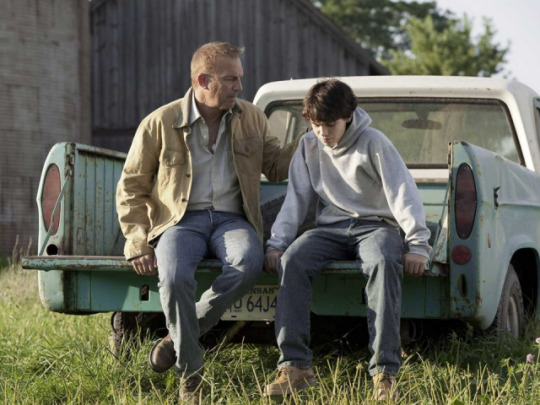
This Clark Kent was also a victim of bullying as a teenager but never retaliated despite him being aware of his physical strength. He keeps this attitude well into adulthood when a drunk man tries to instigate a figth with him at the bar he worked at. (but he did wreck his car though)
Clark remains humble and good despite his many bad experiences with humans, because he has also seen the good in humans: in his parents, in his childhood friend Lana who defended him against a bully, in his coworker who “saved” him from getting injured on the boat but also in Lois Lane who agreed to keep his secret out of empathy for him even though she had the opportunity to sell his story to the press.
However, Clark is for the most part very lonely throughout the first half of the movie.
Therefore, this version of Clark Kent has some heavy bagage and is not the cheerful, smiley and optimistic superhero people expected to see.
But there is a reason behind this creative choice.
Clark’s Kryptonian parents sent him to Earth to give him the opportunity to create a better world than Krypton ever was, with Clark as a beacon of light. Krypton was depicted as this very advanced society in which births were artificially made and every child were designed to fulfill a role in society.
Except for Clark. He is the only Kryptonian in centuries to be conceived in a natural way which means he has total free will on his aspirations and goals.

“Your mother and I believe Krypton had lost something precious. The element of choice, of chance. What if a child dreamed of becoming something other than what society had intended for him or her?” - Jor El, Man of Steel (2013)
This Superman is good, not because he was born to be perfect, but because he has decided to stay true to himself and embrace Earth as his home.
It would be easier for a powerful being like him to choose evil, yet Clark chooses otherwise.
In fact, this Clark Kent feels way more grounded and realistic, he is not free from flaws and weaknesses and is on a journey to discover himself and figure out where he belongs as an alien on Earth. We have witnessed him struggling, get angry, frustrated and defeated and we have also seen him grow stronger and ultimately choose to believe in Humanity in spite of everything he has seen.
Superman is not portrayed as this God among humans in this movie and can actually be more likeable because of his surprising “human nature”.
Dc’s foundation has always been Superman, and if only one message was to be reveiced it’s that people should hold on to hope, always.
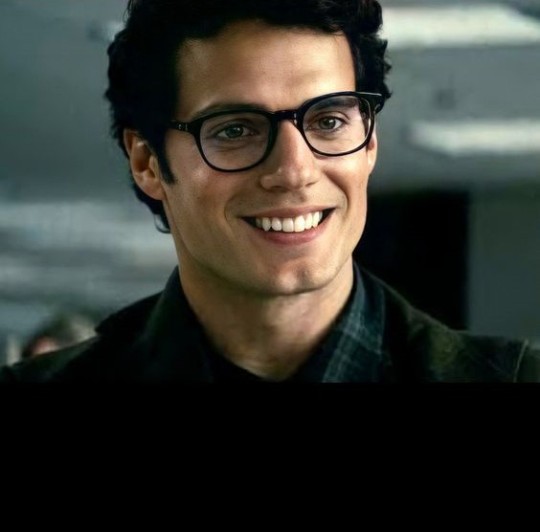
“Embodied within that hope is the fundamental belief in the potential of every person to be a force for good” - Jor El, Man of Steel (2013)
Find more on my Pinterest > X
3 notes
·
View notes
Note
can you ramble about the valentine episode? :3
YES YES YES YES YES YES !!!
SO THAT EPISODE IS THE EPISODE WHERE OUR SHIP BECOMES CANON. MR PLANT AND ARGOS BECOMES "MORE THAN FRIENDS". I REALLY REALLY LOVE THAT EPISODE, BECAUSE IT REALLY KINDA LIKE SUBVERTS THE NORMAL STUFF?? LIKE IDK HOW TO EXPLAIN IT BUT LIKE, NORMALLY MR PLANT LIKES WATCHING TV BUT THAT DAY THE TV MADE EVERYTHING WORSE. NORMALLY ARGOS IS THE ONE WHO COMES TO HIS VOID BUT THAT DAY MR PLANT WENT TO HIS. NORMALLY MR PLANT AMD ARGOS ARE JUST FRIENDS BUT THAT DAY THAT CHANGED.
AS ALWAYS, I REALLY REALLY LOVE ASHUR'S ACTING WITH ARGOS. THE WAY HIS FACE SLOWLY TURNED INTO SADNESS WHEN HE WENT TO MR PLANTS VOID AND SAW MR FLOWERS PICTURE THERE, THE WAY HIS VOICE WAS SO UNCERTAIN WHEN HE ASKED IF THEY WERE MORE THAN FRIENDS, AS IF HE DIDNT WANNA GET HIS HOPES UP IN CASE HES WRONG, THE WAY HIS FACE LIT UP AND HE GOT ALL EXCITED AND COULDNT EVEN FORM A SENTENCE WHEN MR PLANT CONFIRMED IT.
ALSO ALSO, MAYBE IM JUST DELUSIONAL BUT. ARENT THESE THE CARDS THAT THE VALENTINE HEART GUY WAS SELLING???? DID MR PLANT TAKE ALL OF THEM, TRY TO FIND WHICH ONE WOUKD BE THE BEST TO GIVE ARGOS, BUT THEN SETTLED ON THE ACTUAL HEART GUY?????????
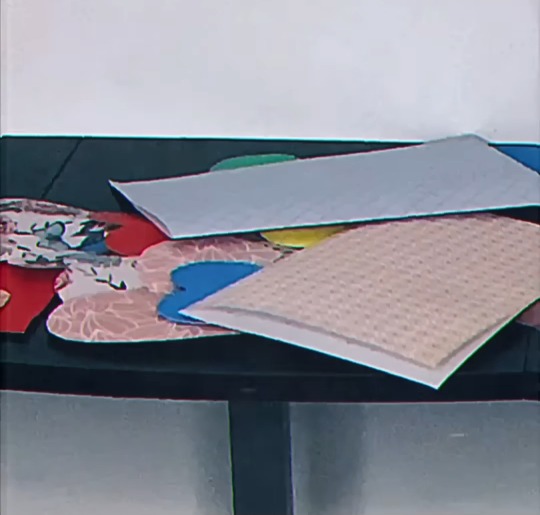
OH AND ALSO. I ALSO LOVE HOW WHEN ARGOS ASKED IF THEY WERE MORE THAN FRIENDS, MR PLANT SHRUGGED INSTEAD OF NODDING. I FEEL LIKE IT WAS A NICE TOUCH CUZ THIS SHOWS US HOW MR PLANT NORMALLY DONT FEEL LOVE YKK AND HE DOESNT KNOW HOW TO PROCESS HIS EMOTIONS CUZ NOW HES FEELING LOVE. WHICH IS SMTH HE HASNT FELT FOR SUCH A LONG TIME.
ALSO I LOVE HOW THEY BOTH GOT IN EACH OTHERS HOUSES WHEN THE OTHER DIDNT OPEN THE DOOR FOR THEM. LIKE THEY HAVE EACH OTHERS HOUSE KEYS EVEN WHEN THEY WERE FRIENDS?? (OR MAYBE THEY JUST DONT HAVE LOCKS IN THE VOID)
IM KINDA SAD THE HEART GUYS DEAD THO LIKE. I ACTUALLY LIKE HIM SO MUCH AS A SIDE CHARACTER I WISH HE WAS BACK. I LOVE HIS SIMPLE AND CUTE YET SLIGHTLY UNSETTLING CHARACTER DESIGN, I LOVE HIS Y/N BLUE ORBS, I LOVE HIS LOVE FOR VALENTINES DAY (VALENTINES DAY IS ACTUALLY MY FAV HOLIDAY!!), I LOVE HIS VOICE, I JUST LOVE HIS OVERALL CHARACTER.
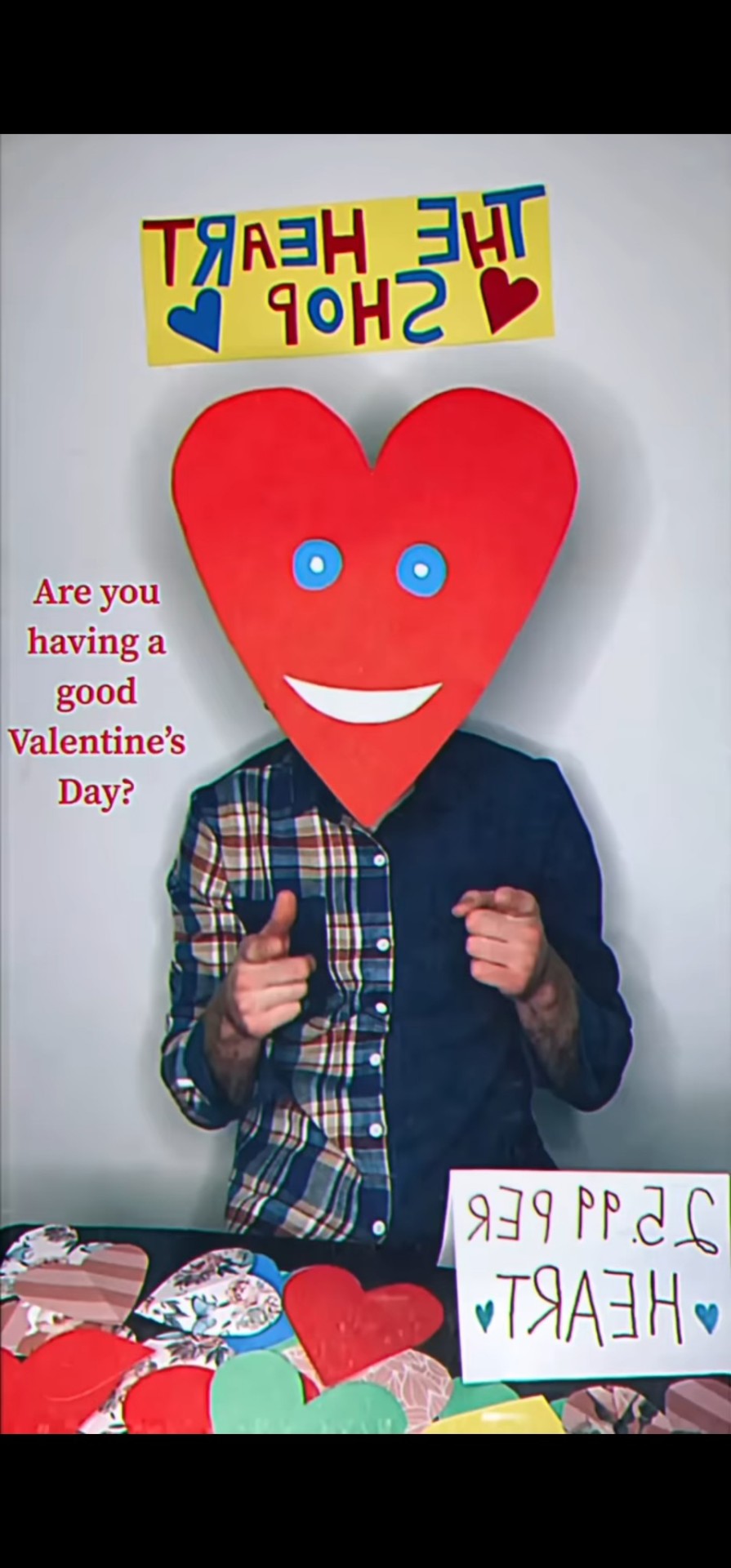
Anddddd that's all for the rambling!! This was so fun omg yall if u want me to ramble about an episode just go ahead and ask me for it like I actually love LOVE rambling it's so fun!!!
#an_theduckin#twomp#ashur gharavi#asks#thanks for the ask!#fav post#my ramblings#movie essay#twomp episode rambling#the world of mr plant#Valentines day episode#my text posts
14 notes
·
View notes
Text
Interestingly, Amazon's Rings of Power issues can actually be summarized into its costumes
OR: Why Númenor cannot really look like Rome
Hello again, I YET LIVE! 💃
Soo, I haven't been able to write in ages cause since my graduation I've been in full monday to saturday 9AM-7PM proletarian mode, and I am a brazilian living in Brazil during one of the biggest attacks on democracy that we as a nation have experienced since the end of the military dictatorship 37 years ago aka Bolsonaro which is as nice as a kick in the nose, BUT FOR THIS SPECIFIC CASE, I, like palpatine, HAVE RETURNED.
but I'll make this one quick tho I swear (kkkkkkk)
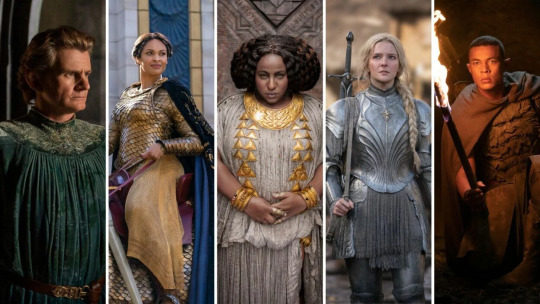
I'm gonna talk about fictional characters' clothes.
And before I start, a brief disclaimer, I HAVE NOT FULLY WATCHED RINGS OF POWER YET. In fact, I've only watched the first three episodes. First because I didn't have the time, and second because honestly if they wanted to keep my attention longer they should've tried harder to make me care about any character other than my little boy Arondir, which they didn't so here we are.
But seriously, I'd like to make something very clear, I have absolutely no rights to tell you if Rings of Power is good or not, because I haven't watched it in its entirety, simple as that. That's not my point here, so if you liked this show, if you were moved by it, if it brought you back to a happy and safe place in Middle Earth, I'm glad, because that's great. We are living in very difficult times worldwide, and I will be the last person to condemn someone for consuming media that makes them happy and comforted. My issues here with it lies in a much simpler department, and that's what I'll be going on about.

✨ CHEAP COSTUMING ✨
And seriously, as I've said before, haven't watched the show, so I'm not even going to get into the merits of addressing good costuming in the narrative field, or the character development field, or anything like that – and you can easily find A LOT of videos and articles by much more qualified people than me covering these topics in detail. I'd just like to point out the problems with these costumes in the most basic way possible: they're the laziest thing I've ever seen since the end of the Night King in that 8th season.
And honestly that's embarrassing.
So look, I wouldn't be so picky if this were literally any other fantasy production.
While I fully understand and agree that any work must be able to stand on its own, and be amenable to analysis and criticism as a unit short of "necessary" contextualization, I also believe that in certain cases this separation is not, and should not be, possible – and in this scenario, this is the case of the construction of an universe. When you transfer this to the media field, it translates into the construction of the imagery of a universe, and for me, in my opinion, in these situations you cannot analyze each work of a same universe separately.
They need to dialogue with each other, and in the case of imagery, they need to have visual connections.
And one of the most powerful ways to convey to an audience that yes, this work takes place in this particular universe, is through costuming and characterization.
It is as if someone asked you to go to the market to buy lemons, and then showed you what a lemon is, so that when you arrive at the market, you can identify the lemons, and differentiate them from, for example, an orange, or a lime, or a tangerine. Right?
Rings of Power did not understand that.
Pray tell me, can you differentiate the lemons from the limes here?
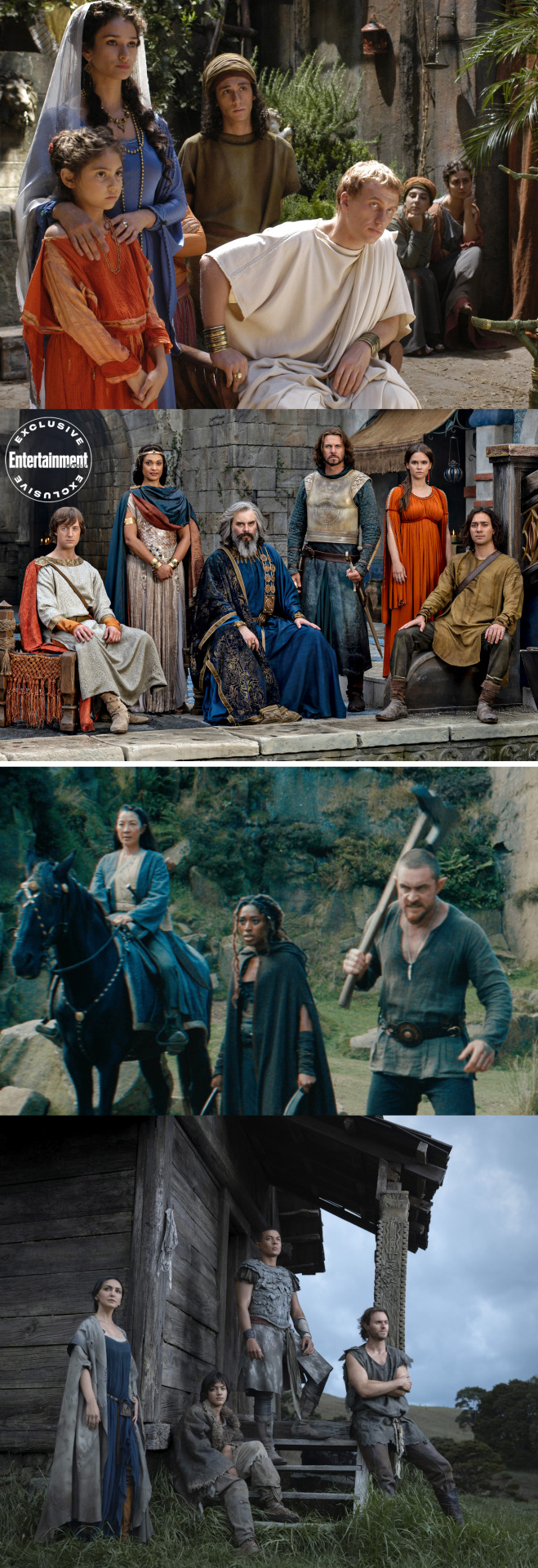
Really, can you?
If you didn't already know these series, would you really be able to point out for sure which is which? Or, more importantly, which universe are they a part of? And, even more importantly, if you didn't already know, could you point out to me which of these are Lord of the Rings?
I couldn't.
And actually, there's inherently no problem for you to have a fantasy series with generic fantasy costumes (I, myself, particularly prefer it when the costumes aren't generic, but there are a number of shows or movies where the costumes might not be the most distinguishable thing in the world, but work really well in that context and are overall great costumes. That's absolutely fine). But in this specific series, it is very much a problem.
Because Lord of the Rings is not generic.
Even if they were creating the first ever visual adaptation of Tolkien works, I would already have rave reviews. But worse than that, they're putting themselves in a universe with imagery that not only already exists but is METICULARLY well established by the Peter Jackson films.
And what's interesting to me isn't even the fact that they're different from the costumes in the Peter Jackson movies. Depending on how it was done, I could at least respect the decision to create a completely fresh identity (provided it could dialogue with the previously established one, and with the worldbuilding created by Tolkien in the source material). What I find interesting is that in pretty much every costume, I can see where they got their inspiration from. And they are all the laziest possible.
Take Númenor for example. It's as if they looked at a summary of what Númenor is in Tolkien's writings and thought "a colonizing nation and mighty empire that existed before a society that years in the future would be represented as medieval inspired = Roman Empire". And/or Macedonian/Byzantine, for I can see a mixture of elements of those in many of the costumes and settings.
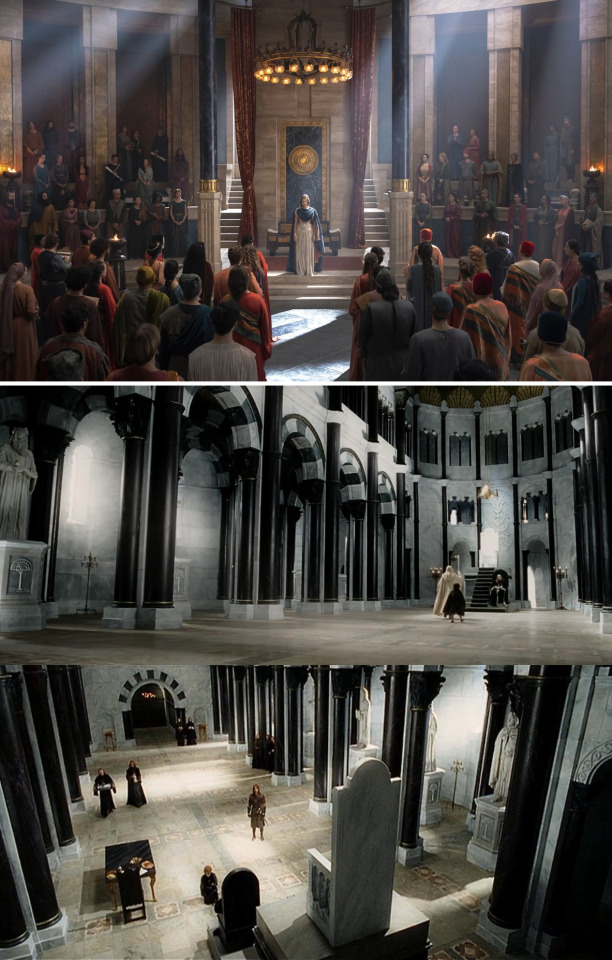
Even in the setting of the scenes: Compare the throne room of Númenor with that of Gondor, the latter with rounded columns and elliptical arches and a direction that always showed the room diagonally – from the corners, or behind the throne, to create an effect of disharmony, emptiness and decay (in almost every scene, the columns seem to be a little slanting). In contrast, the hall of Númenor is presented in the most squared and geometric way possible: the columns are straight, the scene is perfectly framed in the center, perfectly mirrored, and all the lines are either parallel or perpendicular, indicating straightness, balance and patterning – very Hellenic.
The association seems to be very obvious at first glance. The Hellenic empires are by far the best-known and most perpetuated example of empire in the mediatic imaginary of our Western culture, so it's a very easy way to convey to us, the audience, that these guys are your standart big "advanced" and colonizing civilization that see themselves as "closer to the gods" or something. And ok, fine.
I don't think the concept of being aesthetically inspired by the Romans would be anywhere near bad, were that any case other than Tolkien's universe.
For example, within the imagery created by Tolkien I would much rather see a Celtic inspiration for Númenor than a Roman/Macedonian one (since we're talking about great cultures that preceded Christian kingdoms in Europe), simply because this Roman aesthetic, while efficient in giving us the most basic impression possible about these people as lazily quickly and efficiently as possible, inevitably ends up pulling us by the throat out of the immersion of Middle Earth. It simply breaks it.
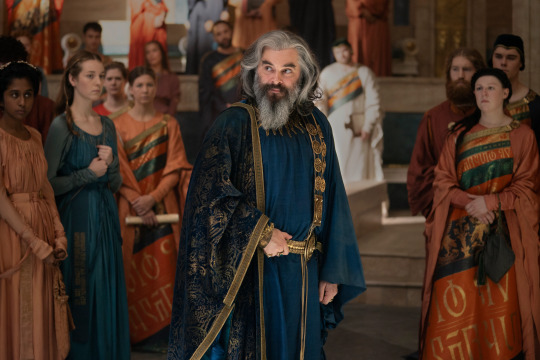
Like, really tho, would you bait an eye on this an call it Middle Earth??
And ok, fine, I know the Celts aren't the first association we make with "great nation" (and actually they were colonized and genocidated by the Romans so there's that lovely layer) BUT THE THING IS THAT MIDDLE-EARTH IS NOT THE REAL WORLD. And yes, I know that Gondor can easily be associated, yes, with Rome and the Byzantine Empire, and that Númenor is very much Atlantis. But one thing is contextual and narrative inspiration, another is aesthetic inspiration. And it's aesthetics I'm talking about here. If the two always went hand in hand, then in House of the Dragon we would have to see the Targaryens walking around 24/7 in full roman attire.
That's what I mean when I call the costuming lazy. Because it's much easier for you to make a visual association than to actually build one through writing and narrative construction. And that's why I say that for me this is a reflection of the whole series. They seem more focused on making checklists in a basic formula than showing us, you know, Tolkien.
"Oh but Númenor is clearly based on Atlantis, you said so yourself", technically, yes (and Tolkien wrote of Númenor as Atlantis in several of his letters), but primarily, Númenor is simply a big island that was swallowed by the sea, and this mythology is by no means unique to the Greeks. In adaptation, Númenor could be based for example on the Cornish "Lyonesse", or on the Breton "Ys", or even the Gaelic "Hy Breasail". Atlantis is just the most well-known version of this myth (to put it simply), and therefore the one that would be most quickly recognized, and therefore the easiest to pull off.
In fact, if one were to delve deeper into the meaning of the fall of Númenor (and there one can even extend to the greater meaning of all these mythologies entering 100% in the field of the collective unconscious and Ginzburg-ish tracks), to which the Tolkien refers to as the second fall of man, with "its central theme is (inevitably, I think, in a story of Men) a Ban, or Prohibition" [x]. The Numenoreans desired immortality, and for their pride they were banished, forbidden from entering the Undying Lands of Aman – which, essentially, comes very close to the idea of the Fall embodied by Christianity.

Satan's Fall From Heaven, illustration by Gustav Dore for John Milton's Paradise Lost
As Tolkien himself said in his 1951 letter to Milton Waldman:
"I dislike Allegory – the conscious and intentional allegory – yet any attempt to explain the purport of myth or fairytale must use allegorical language. (And, of course, the more 'life' a story has the more readily will it be susceptible of allegorical interpretations: while the better a deliberate allegory is made the more nearly will it be acceptable just as a story.) Anyway all this stuff is mainly concerned with Fall, Mortality, and the Machine. With Fall inevitably, and that motive occurs in several modes." [...]
"This desire is at once wedded to a passionate love of the real primary world, and hence filled with the sense of mortality, and yet unsatisfied by it. It has various opportunities of 'Fall'. It may become possessive, clinging to the things made as 'its own', the sub-creator wishes to be the Lord and God of his private creation. He will rebel against the laws of the Creator – especially against mortality."
Letter to Milton Waldman, 1951, p. 2 – you can read it here
And directly about Númenor, (if you wanna go full nerdy here), he stated that
"The Downfall of Númenor, the Second Fall of Man (or Man rehabilitated but still mortal), brings on the catastrophic end, not only of the Second Age, but of the Old World, the primeval world of legend." [...]
"Their reward is their undoing – or the means of their temptation. Their long life aids their achievements in an and wisdom, but breeds a possessive attitude to these things, and desire awakes for more time for their enjoyment. Foreseeing this in pan, the gods laid a Ban on the Númenóreans from the beginning: they must never sail to Eressëa, nor westward out of sight of their own land. In all other directions they could go as they would. They must not set foot on 'immortal' lands, and so become enamoured of an immortality (within the world), which was against their law, the special doom or gift of Ilúvatar (God), and which their nature could not in fact endure."
"There are three phases in their fall from grace. First acquiescence, obedience that is free and willing, though without complete understanding. Then for long they obey unwillingly, murmuring more and more openly. Finally they rebel – and a rift appears between the King's men and rebels, and the small minority of persecuted Faithful."
Letter to Milton Waldman, 1951, p. 7 - 8
So like, I think there was a lot of room to go around here. There was absolutely no need to deviate from the already existing aesthetic (from the movies) in order to evoke a counterpart in the real world – to me, this just impoverish interpretations, discussions and overall the whole work. A great example of this is the Numenorean symbol.
In the books, the main symbols of Númenor (if I'm not mistaken) are the tree of Númenor, the eagle and especially the five-pointed star.
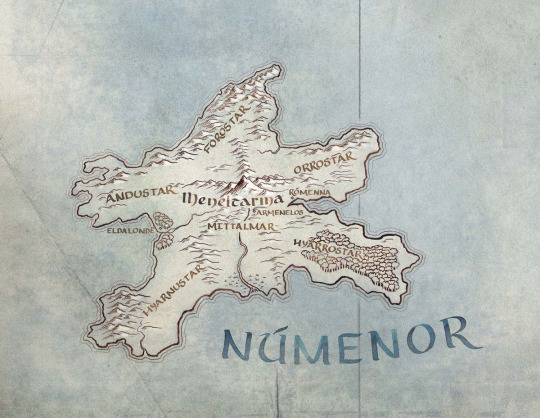
The island (or continent) on which Númenor was located was in the shape of a five-pointed star, and they were a nation that relied largely on astrocartographies for their navigations.
So you would assume that we would see these symbols on the series, right? Five-pointed stars and trees and stuff like that, right?
Wrong
They gave us this:
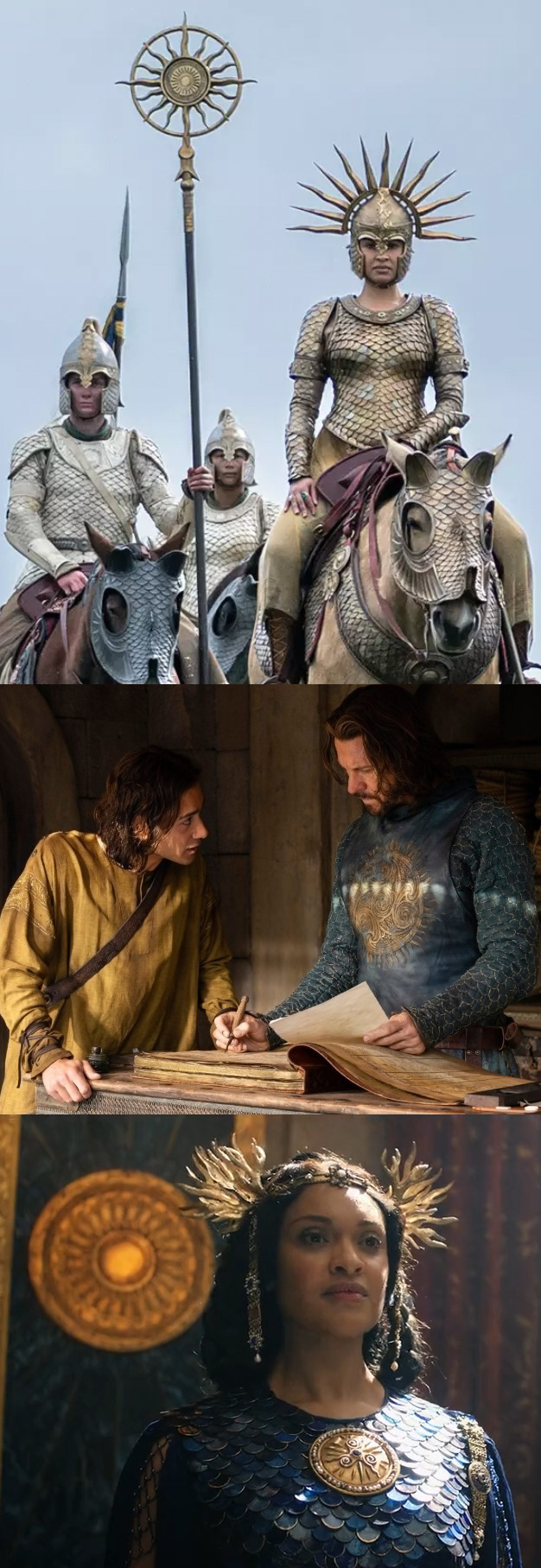
The golden Sun
Nowhere in Tolkien's writings (to my knowledge) does he compare Númenor with the sun. I know that technically the sun is a star, but these are completely different archetypal symbols. Tolkien's greatest association with the sun is in relation to Anar, and the Two Trees (and perhaps one could even make an association about how in Middle-Earth the sunlight is "inferior" to the original light of the Two Trees as a metaphor for like the Numenoreans try to persue immortality and emulate the elves, but honestly it's a very long stretch).
(being fair, they did try to play with some celtic sun symbols there, but it ended up just looking out of place)
The main association with the golden sun in our western culture (excluding indigenous cultures, Mesoamerica and South America, we have our own relationships with the figure of the sun that does not enter here at all) is with the Panhellenic symbol of the Macedonian Sun, or Vergina Sun.
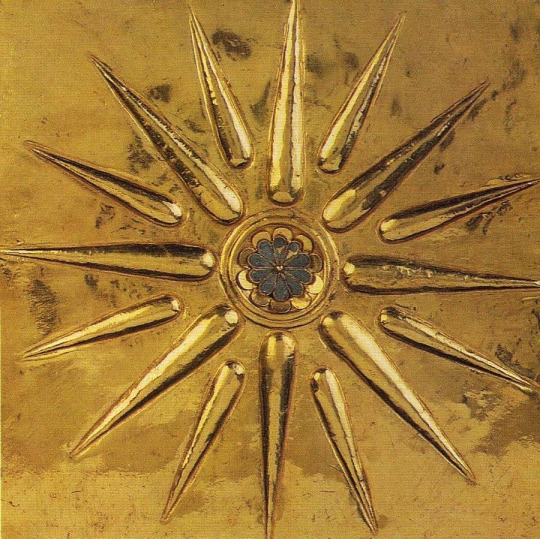
You can see the resemblance very clearly, especially in that golden banner in the first image
And there is, again, no problem with you drinking from real world inspired sources to build a fantasy world (every fantasy world is an analogy to the real world and etc etc). But if you're going to make direct visual associations with real-world elements, those associations must be very well thought out and very well planned. Otherwise, as happened (in my opinion) with the golden sun of Númenor, you end up breaking the immersion of a visual universe that, if it drink from some source, is not the one you used.
Famously, the great inspirations for Tolkien's work were Germanic, Celtic, Finnish, Slavic, Greek and Norse language, folklore and mythology, especially the Icelandic sagas and ultimately the basic christian structures. [little sources 1, 2 and 3 if you wanna know more, or you can go to the first page of Tolkien's letter to hear it from the man himself]. You even have this whole diagrams going on about it:
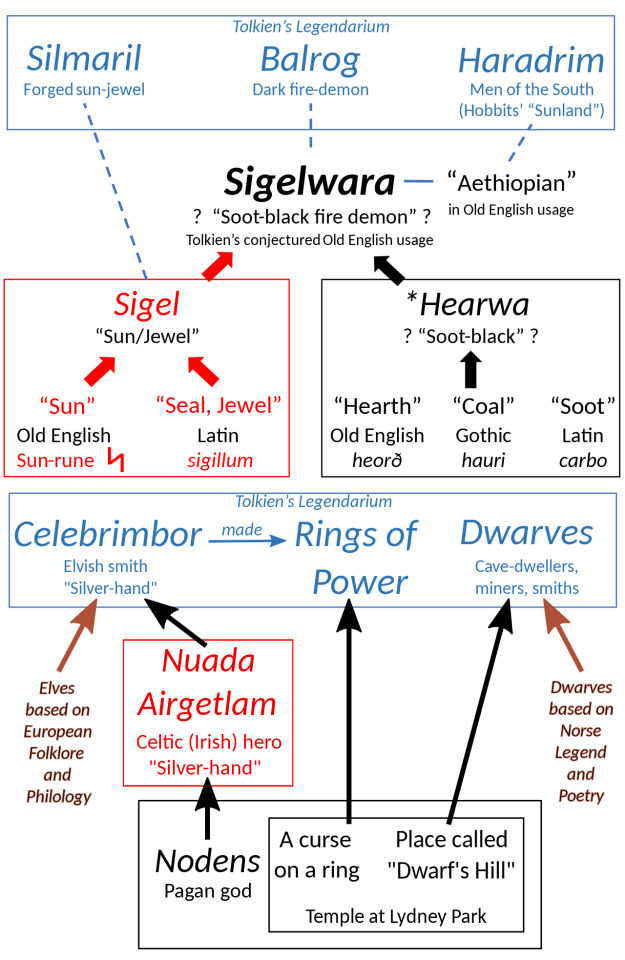
This is the foundation of the universe, this is the fountain you will want to drink from. And that's the source that Ngila Dickson drank from to make the costumes for the Lord of the Rings movies.
Compare for example Elendil's costumes from the The Fellowship of the Ring (2001), and then from Rings of Power (2022).

Can you see where I'm coming from?
Ngila Dickson's take on Elendil not only fits perfectly into the setting of this world being presented to us, but it also manages to create a unique and recognizable aesthetic for the character (and therefore, for his people).
When, in the third film, we see Aragorn'scoronation, it is not difficult to recognize if not the armor, but at least Elendil's royal crown.
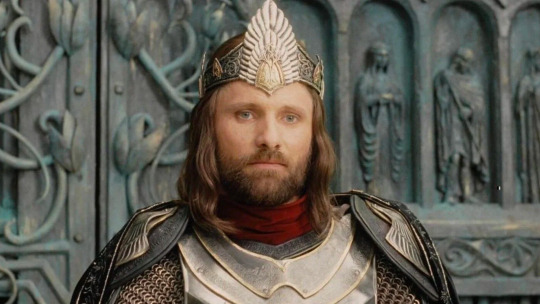
Dickson plays not only with historical inspirations but mainly with associations within the visual universe of the films: in the crown alone, you can see inspirations taken from the architecture of Gondor itself: the crown aesthetically resembles the city. She's not referencing the real world, she's referencing Middle Earth.
In Rings of Power, Elendil only looks Byzantine.
And that's just lazy.
Also, for some reason I didn't get, the elves also wear roman elements? Like, what's the point of that? Are the Numenoreans then trying to copy the elves in some way, or…? Idk???
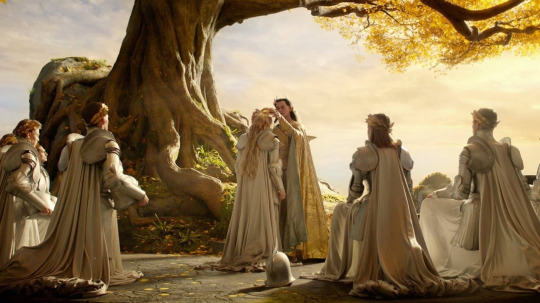
What's with the laurels? Did I miss something or...????:???^::??
And honestly I could go on and on and on on the elves ALONE, but a lot of people already covered that and this is already getting long enought so for my point here I'd only like to point out one detail that dialogues with my lazyness critique here, and it regards Galadriel.
Now, once again, I COULD GO ON AN ON ABOUT HER PORTRAYL (and I'll sure be doing a post addressing female archetypes so I won't extend myself here) but not my point here, I'd only like to talk about this particular dress:
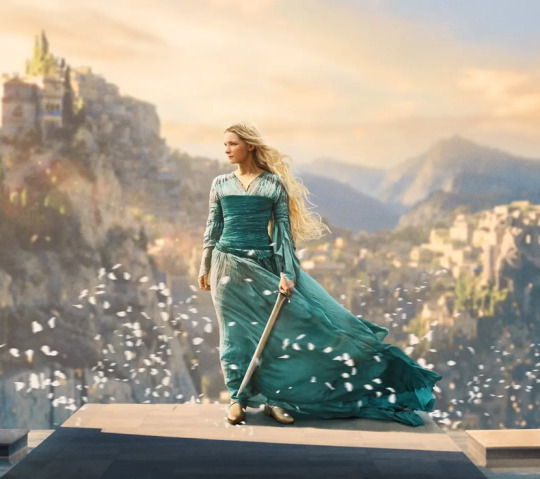
The blue dress
To be quite blunt, the thing with this dress is that it is literally a copy of Éowyn's maiden dress.
Literally.

It's so ridiculously blatant.
The impression it gives me is that they, once again, instead of even trying to show through writing or narrative construction a certain element, they simply copied and pasted the most obvious thing possible. They wanted to say "look at how Galadriel is a strong warrior woman" so they just made her look like the other "woman with a sword" in the franchise.
It was a big "she's the new Éowyn pls like her" move.
Instead of giving her... you know... her own construction? Some individuality? Any at all?
And that, in addition to being extremely lazy YET AGAIN, is a big shot in the foot (Brazilian saying, don't know if it makes sense in english sorry), because it only makes us compare the two directly. And even if you liked Rings of Power, I think we can all collectively agree that the Galadriel we were introduced to is definitely no Éowym.
So why did they do it??? because they're lazy that's it that's the point
It's the same with the thought of putting on a Wooden Elf with armor that looks like WOOD, or taking the concept of "people connected with nature" and translating that into purely shoving, idk, a bird's nest on people's heads and making them dirty with earth. Very connected with nature and stuff. It's just LAZYYYYY
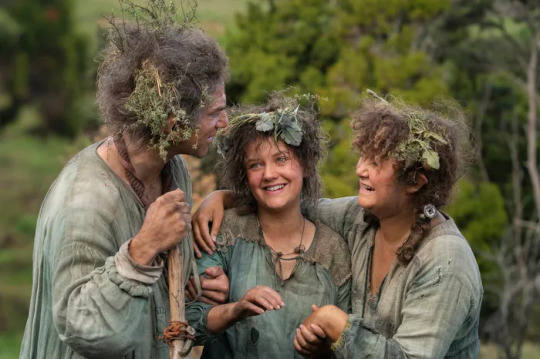
Yes, it's very cute, but.... Costuming-wise, it's just dumb?? You know?
And what screams the most is also the difference in quality between the costumes. The difference in the cut of the dresses, in the quality of the fabrics, in everything. IT SCREAMS. I won't get into that because, again, lot of people already covered that BUT REALLY, I'M SORRY, BUT THIS IS THE MOST EXPENSIVE MEDIA PRODUCTION OF IDK, EVER???? THIS FIRST SEASON ALONE COST NEAR THE BUDGET FOR THE WHOLE 3 LOTR MOVIES AND AND

THE PRINTED FABRICS I CAN'T EVEN-
Like, we had this:

And they thought we'd settle for THIS?????
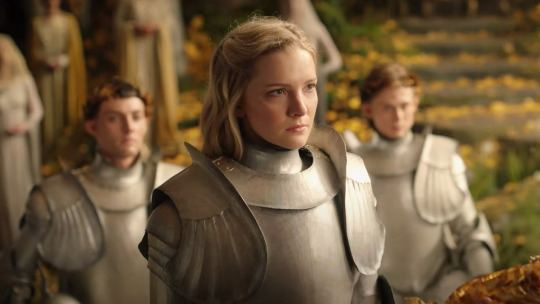
I could forgive this so easily if this was the standart fantasy production. I really could. But this is the most expensive production in history, produced by a billionaire mega corporation that exploits millions of people and literally kills our planet daily, about one of the most well-established universes in the fantastic imagination of our western culture. The least they could do was give us something with a minimum of effort.
I can't talk about their effort on other story elements because I haven't watched the entire series. But, I'm sorry, from the level of care and attention I've seen in these costumes… They literally just did the MINIMUM, and that honestly doesn't really get me excited for the rest of the production.
Like, because they said this character is Galadriel, should we immediately love her just because they said she's Galadriel? To me it fells like they took a LOT of things for granted, and unfortunately it shows.
AND JUST A SMALL ADDENDUM THAT I THINK I SHOULD MAKE
I know that in the big picture, the dwarf costumes are the least worst of this series, and I agree.
ALTHOUGH, YET, HOWEVER
I really think it's extremely complicated for you to represent dwarves as, again, "dirty" and "stubby" people who live in "rustic" caves and are "rustic" and "quarrelsome" and "drunkish". I… I just think it's bad.
Especially with the accent they effectively chose to use for pretty much ALL the dwarves, and seeing them interacting with posh Enrold with his perfect posh British accent… It's just bad.
And I loved Durin's personality and character, but in terms of costumes...
This:

Will never be this:
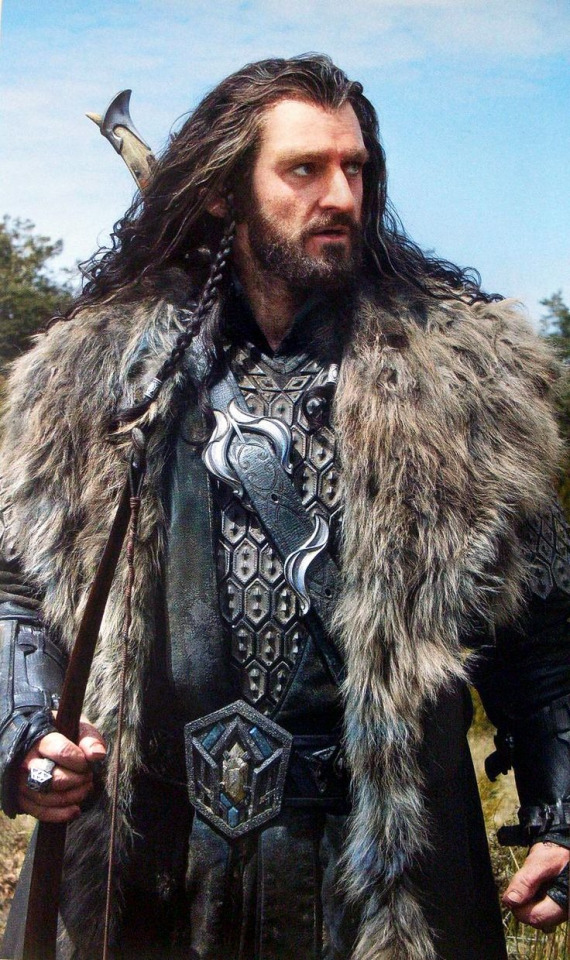
My personal feelings regarding The Hobbit movies aside, THIS is what a dwarf prince looks like for me. Simply as that. Just look at the condition of the fur in both costumes. C'mon.
Anyway, thank you once again for reading!!! This is just my opinion, as always, feel free to desagree with my at any point! ✨
#rings of power#lotr#and honestly I found it troubling and maybe disrespectful to make Sauron charismatic#like there's ac people rooting for him and he is ac rootfull#but that's just my opinion#galadriel#numenor#lord of the rings#the rings of power#costume analysis#costume design#movie essay
50 notes
·
View notes